






















In an increasingly digital and impersonal world, the personal touch can make all the difference. FIDI President Derek Duffy explains why
Here’s a question for you: what can penguins and a Swiss condiment teach us about building great business relationships?
If I clarify that I am talking about a Penguin, the delicious chocolate biscuit from the UK, and that the condiment is Thomy, an equally delicious brand of salad dressing, you’d be none the wiser; so let me explain further with two short stories.
I am extremely fond of cookies. Family and friends would say that this is a gross understatement: I love cookies with a passion.
At the recent FIDI Conference in Edinburgh, I visited the staff office and happened to try a Penguin biscuit for the first time. It was love at first bite. There seemed to be an endless supply at the event; and I ended up making significantly more visits to the office than I have done in the past.
At the Gala dinner, I was approached by one of the conference staff who gave me a very small bag. Inside –you guessed it – were three Penguin biscuits. I was touched; this simple act reminded me of my strong bond with FIDI and made it stronger still.
one of my company’s partners gave me a bottle of my favourite dressing. One of their staff members had noticed my purchase and found out about my fondness for the salad dressing. It was a kind gesture that really reinforced my bond with this company.
These gestures were all unexpected, personalised, unceremonious and thoughtful. I was overwhelmed and so grateful that these people made such an effort to do something that meant a lot to me.

The second story: in the many times I have been lucky enough to visit Switzerland during my career – often for FIDI Academy events – I have developed a liking for the country’s ‘French style’ Thomy dressing, which has a quite unique taste. I now have a tradition of bringing a bottle home with me to Canada after every trip.
On the final night of the FIDI Academy LiM earlier this year, we stayed at an airport hotel in Zurich, where I popped out to buy my usual from a local grocery store. Fast forward to Edinburgh and
It reminded me of the impact ‘small’ gestures can have, for both giver and receiver. While such actions might appear minor, when well executed they are incredibly powerful tools for building strong relationships. In a world that is increasingly driven by digital interactions, personal touches can make a huge difference. When one person pays close attention to the needs of another, it sends a clear message, highlighting a level of care and consideration that goes beyond a ‘usual’ business interaction, building reputation and relationship.
Going the extra mile in this way is one of the defining characteristics of FIDI Affiliates – as is the strength of our relationships.
The way we build our businesses and generate sales may be changing (you can read plenty about how in this issue), however, unexpected, personalised and thoughtful gestures will always be an important way we can form and strengthen our relationships.
Maybe they are more important than ever.
Have a look around; start noticing the little things about colleagues, clients, and partners that you could act on – it can work absolute wonders for your relationships with them.


Higher Brazil shipping costs; Canada rail freight action suspended; Maersk issues General Average notices; Venezuela unrest impacts movers; Portugal immigration rules tightened; Mobilitas gets Africa development cash; more Hungary HHG regulation; Djibouti shipments on hold
Andrew Bennett looks at the changing nature of sales and the challenges for movers to compete in the new environment
FIDI Focus Editor Dominic Weaver speaks to representatives of different sectors of moving about appealing to recruits of the future
Rossella Scalone tells FIDI Focus about setting up Italian moving business Magnolia, which specialises in the luxury end of the market
22-28 PORTUGAL
Andrew Mourant finds out how Portugal’s movers have adapted to the pandemic, Brexit, and recent restrictions to immigration
61 ATLAS MOVING
Managing Director of Atlas International Moving’s Swiss branch, Peter Visser, tells FIDI Focus about establishing the business
65 EARTH RELO
President of New York-based Earthrelo Samir Shah on why joining FIDI is a key part of the company’s plans
68 MW RELOCATION
CEO and founder of Swiss mover Mark Muss talks about using FIDI principles as a benchmark for the company since its inception
70 ORBIT INTERNATIONAL
Adi Shaked, President and CEO of Orbit International Moving Canada, on the company’s motives for becoming a FIDI Affiliate
18 PCG s
FIDI’s Business Intelligence Manager, Marie-Pascale Frix, gives details of the updated PCG recommendations
29 FIDI BUSINESS BAROMETER
We look at some of the headline results from the latest FIDI business barometer
40 FIDI ACADEMY
An overview of the second outing for FIDI Academy’s new DSP seminar, which will run in Vienna in February 2025
50-52 FIDI ASSOCIATIONS
An interview with FIDI Germany President Susie Freifrau von Verschuer and General Manager Ellen Troska about Association best practice
56-57 FIDI CARBON CALCULATOR
Emma Ghebaru, Account Executive at Worldfavor, on the firm’s Carbon Calculator collaboration with FIDI
62 – 64 FIDI CONFERENCE
FIDI Focus meets the teams behind the scenes who are essential to the success of the annual event
20 AT A GLANCE Statistics on Portugal
71 PEOPLE MOVES
Fifth generation onto Keller board; Shipeezi appoints CCO; Graebel announces new CEO; ISS promotes D’Souza; Tate and Barner join OMNI board; JK makes senior appointments
72 OBITUARIES
Max Chorus and Moore Shanks








What can Penguin biscuits and a delicious Swiss salad dressing tell us about building strong business relationships? FIDI President Derek Duffy explains Page 5
FIDI Secretary General Jesse van Sas argues that salespeople who learn about their whole business can develop better partnerships with customers Page 21
Companies that take a modern approach to sales understand that this is about a lot more than just securing business, says FIDI 39 Club President Jackie Stouffer Page 42
How to keep your presentations lively – and your audience awake. By Magali Horbert, FIDI Sustainability & Strategic Communications Manager Pages 66-67
www.cplone.co.uk

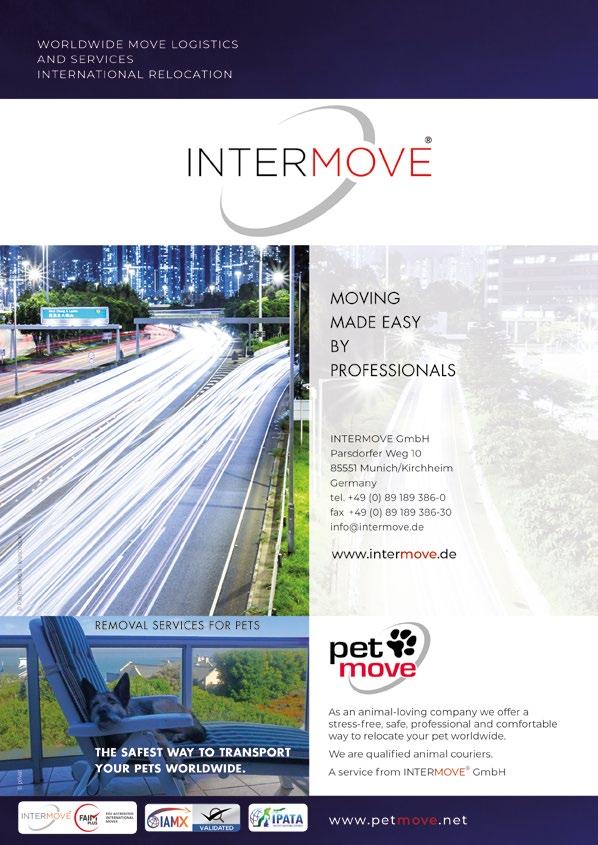

Sales in the moving industry have changed – and dramatically. Gone are the days when ‘closing the deal’ was simply about direct contact: phone calls with clients; face-to-face meetings; perhaps an occasional 18 holes on the golf course.
As RMCs have muscled into the corporate market, they have weakened the link between the clients and many of the companies that are carrying out the moves, and the recent rise of lump sum and other packages are shifting the buying power from several corporate customers to many private ones. There are naturally opportunities here, but complexity and new skills needed, too.
With the price of everything, everywhere seemingly at all-time highs, most customers are more cost conscious. Margins have been driven down in most sectors, and providing keen prices is more important than ever. Against this backdrop, selling to procurement - rather than HR or mobility teams who know and have a relationship with the transferee and mover – is more common, while the volumes of goods involved continues to slide.
(A side note here: the luxury goods segment of the industry remains largely untouched by these
price pressures, requiring first and foremost a highcare, always-on service. For a fascinating insight into what is takes to specialise in this area, read our interview with Rossella Scalone, founder of Italybased Magnolia Moving, on pages 58-60).
New technologies have changed the way selling is done, shifting much of it online, and creating new ways for service providers to find customers – and customers to find providers. As Rob Gilbert, CEO of Irish Affiliate Oman Beverly Smyth, points out in our sales feature on pages 30-38, businesses must get to grips with these new methods extremely fast – or they risk losing out.
With all this going on, and despite financial pressures, it is vital for movers to invest in developing strong salespeople with modern competencies. External training can be a significant ally in achieving this, and the FIDI Academy has launched its own sales-focused programme for Affiliates wanting to build expertise or upgrade skills. For more information, contact the Academy (see page 40) or, if you’re at IAM in Las Vegas, visit the FIDI booth. Happy selling!
DOMINIC WEAVER Editor, FIDI Focus
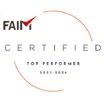
Movers have reported that additional fees levied on shipments into Brazil are set to raise costs significantly from August.
The charges are expected to be at least US$1,000 for shipments into the country from origins including the US, the Caribbean, and parts of South America.
According to Laura Ganon, CEO of 100-yearold Brazilian operator FINK, some shippers have advised that the increases could be as high as US$2,000 from the middle of the month – adding that it could cause further pressure on volumes that are already depressed.
‘The more expensive the freight, the more reluctant the corporate client and, specifically, the private firms are in taking household goods to their new destination,’ she said. ‘So, it

reduces the volumes that are already not at their best.’
Ganon said it was vital that movers dealing with shipments to the country communicated clearly with their clients and
supply chain partners ‘to have a transparent and understandable contract, to make sure you are covered in the event of unexpected changes… and to have tight
controls on the validity of proposals and freight changes while a proposal is still valid, to make sure you can charge the difference without problems or frustrations’.
A shutdown of the entire Canadian rail-freight network at the end of August was reversed when the government intervened to outlaw the action.
The Canada Industrial Relations Board (CIRB) imposed ‘binding arbitration’ on the parties involved in an unprecedented work stoppage at the Canadian National Railway (CN) and Canadian Pacific Kansas City (CPKC), as a result of a dispute with the Teamsters Canada Rail Conference union concerning safety issues around the hours worked by staff.
The disagreement affected around 9,300 workers at the two railways, who either went on strike or were locked out of premises from 22 August. However, the action was forcibly ended on 26 August, after the arbitration notice was served two days earlier.
During the buildup to the shutdown action, Adi Shaked, CEO of Orbit International Moving
(Canada), new FIDI Affiliate based in Toronto, said: ‘Orbit understands that these events and their associated costs are of great concern to our customers, agents and partners. We will do our very best to help all parties concerned navigate this disruption and manage potential impacts.’
Christina McCarte, Director, International, at Toronto-based AMJ Campbell, said on 26 August that Canada’s international ports - Halifax, Montreal and Vancouver – were handling a backlog of cargo for the rail network.
‘We expect ports and terminals will remain congested during this week and possibly next week,’ she said. ‘As rail slowly reopens, we expect new container bookings will be availablehowever, we will continue to route shipments via our warehouses until there is fluidity, and to avoid supplemental port charges.’
Duties have been introduced on shipments of household goods (HHG) into Hungary as the result of new government legislation.
The regulations are applicable to shippers from outside the European Union, including the UK.
Since January 2024, all shipments into Hungary have been subject to physical inspections.
Updated details of the Hungarian rules can be found in FIDI’s Customs Guide on Hungary, available at www.fidi.org
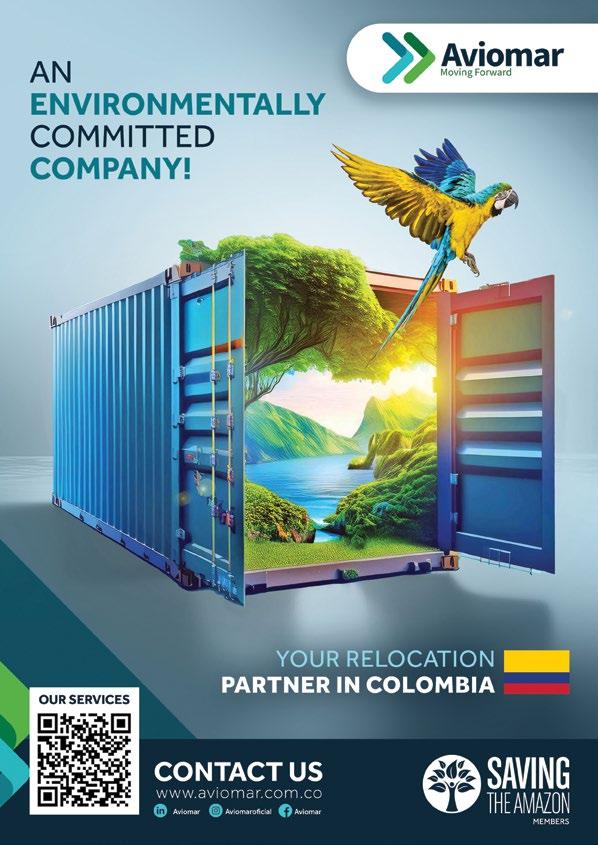
FIDI Affiliates operating in Venezuela have been impacted by violent protests following the disputed general election result, when Nicolás Maduro claimed to have secured re-election.
JJ Mari and Clover International are among the movers that reported they had paused services as a result of the 28 July vote, which led to widespread unrest around the country.
Iramar Aleman, a director at JJ Marí, said the company continued to carry out services including diplomatic shipments and customs clearance, but had switched to contingency operations, including altered staff schedules.
Four days after the election, she told FIDI Focus: ‘We are carrying out services from 7.30am to 2pm for the safety of our operative staff, while our office staff have been working remotely from 8am to 5pm. We are reviewing every day carefully to decide if we continue to this schedule or need to change it.’
Lina Maggi, Vice President of Operations at Clover, said at the end of July that the company had put operations on hold following the election, and hoped to resume services as soon as possible.
On 23 August, the governments of Argentina, Costa Rica, Chile, Ecuador, Guatemala, Panama, Paraguay, Peru, the Dominican Republic, Uruguay and the US called for an ‘impartial and independent audit’ of the vote.
Shippers with cargo on the Maersk Frankfurt will have to contribute to the costs of recovering or replacing it after fires on board the vessel last month.
The ship’s Japanese owner, Tokei Kaiun, has declared ‘General Average’ (GA), a maritime law that requires all stakeholders in a sea crossing to contribute proportionally to the costs of damage or losses incurred during a voyage when a vessel is damaged or stranded, leading to the partial or complete loss of its cargo.
A report by logistics news source
The Loadstar, cited by the Parsifal Corporation, said Richards Hogg Lindley had been appointed as the GA adjusters, and Maersk would be providing guidelines for the GA process. Cargo will not be released for delivery until this process has been completed.
The Maersk Frankfurt had approximately 1,100 containers on board, with the final number still to be confirmed by the company.

New immigration regulations have come into force in Portugal, following a government revision and announcement in June.
The change – reflecting a shift to more right-leaning policies by political parties across Europe – has revoked the ‘manifestation of interest’ mechanism. This allowed non-EU migrants who didn’t have an employment contract to move to Portugal and request residency after they had made social security payments for a year. Migrants must now have an employment contract in place before moving to the country.
The government said it will now prioritise the entry of ‘qualified’ professionals, students, people from Portuguese-speaking
countries, and people moving to be with family already in Portugal.
Portuguese Prime Minister Luís Montenegro said there are currently around 400,000 pending regularisation processes. The government aims to tackle this with a dedicated task force and a restructure of its new migration and border agency, and by increasing staff working in this area.
Rossana Veglia, Chief Mobility Officer of Portuguese Affiliate Global International Relocation, said: ‘The new rules represent a significant advancement for immigration policy in Portugal. The creation of a task force to address pending processes demonstrates the government’s commitment to resolving bureaucratic issues more efficiently.
‘In a time of so many changes, it is inevitable to observe a period of uncertainty and confusion. In this context, the importance of professional guidance, such as that provided by Global, becomes even more evident in facilitating and clarifying the processes.’
See feature, pages 22-29.
Get professional marine insurance solutions from experts with over 100 years combined experience. With fully automated online solutions for you, competitive rates from A rated insurers, and peace of mind claims handling for your clients.

Mobilitas has gained a €20m (US$22.39m) loan to support development of its business in Africa and the French overseas territories.
The loan, from Proparco - the private sector financing arm of Agence Française de Développement Group – has been earmarked to help Mobilitas accelerate its growth by building sites in Ghana, Kenya, Mozambique, Uganda, Tanzania, and New Caledonia. It is the third collaboration with the company, which also supported Mobilitas with its Africa 54 plan in 2014, and the development of its African moving and recordmanagement activities in 2018.
The project is designed to contribute to UN Sustainable Development Goals #5 (Gender Equality) and #8 (Decent Work and Economic Growth).
Cédric Castro, Chairman of the Management Board of Mobilitas, said:
‘Proparco has been supporting and financing our development projects in Africa and the French overseas territories for the past 10 years. It has become a key partner for the sustainability of our projects in these parts of the world. Mobilitas and Proparco share the same vision and values on the issues of equity and diversity.’
Françoise Lombard, Managing Director of Proparco, said: ‘Mobilitas is a longstanding partner for us. We are very pleased to support its growth in Africa through this third loan, and especially as this French group is fully committed to the fight against gender inequality, a priority concern for Proparco.’
Founded in 1974 by André and Sarah Taïeb, Mobilitas is still a family business, with a turnover of almost €550m and 5,740 employees working in 205 subsidiaries in 102 countries.
The Corporate Housing Providers Association (CHPA) has reached a record membership of 340 companies. It said the achievement underscores its ‘pivotal role in the corporate housing industry, serving as a testament to its growing influence and commitment to excellence’.
The leap in membership numbers included 75 new members. ‘CHPA continues to expand its reach and impact, advocating for best practices and industry insights, and creating a space for like-


minded professionals to connect,’ said the organisation. ‘The 2023-24 membership year marked a historic moment of expansion, as CHPA added membership in Africa, increasing representation of members across the globe.’
CHPA is one of the six co-founders of the Coalition for Greener Mobility, which includes FIDI Global Alliance. It offers membership to companies of all sizes, including providers, agencies, associate partners and industry supporters.

UAE-based DASA International Movers has celebrated its 45th anniversary.
Set up in a small Abu Dhabi apartment in 1979, DASA began with a focus on commercial shipments. It expanded into relocations in 1984 and into Dubai in 1997. The company was among the first to earn FIDI FAIM accreditation in 2000.
In 2022, Craig Reilly, the founder’s son, took over the business, overseeing a rebrand, an increased focus on sustainable shipping practices and environmental initiatives – such as planting a tree for every shipment booked in 2024 – and desert clean-ups by DASA staff. The company is one of three companies in the UAE to have become a member of OMNI.
CEO Reilly said: ‘DASA’s journey has always been about more than just moving goods; it’s been about moving forward – embracing change, driving innovation, and staying true to our values of excellence and integrity. As we celebrate 45 years, we look back with pride and forward with unwavering commitment to redefining what it means to lead in our industry.’
The company celebrated with a community raffle in June, offering customers who booked a move the chance to win a grand prize that covered their relocation costs. The winners were revealed in a live Facebook event with the Department of Economic Development.
Contact us or scan the QR code today, to learn how we can help you unlock the full value of your insurance and keep your clients protected with ease.
Brytor International has moved from Mississauga to Etobicoke, Toronto. The new premises provide easier access to downtown Toronto, Pearson Airport and major routes,and include a bonded warehouse licence.
UK-based Bournes Moves won the People First accolade at the 1066 Business Awards, hosted by the Let’s Do Business Group. The award celebrates employers with a clear commitment to creating a positive workplace culture, nurturing professional growth, and prioritising their workforce’s wellbeing.
Gosselin
Gosselin’s warehouse at Brussels airport was hit by a large fire in June. The 4,000 sq ft facility was reportedly destroyed in the blaze on the grounds of Brucargo, with other companies donating space to help the business. No one was injured in the incident.
Czechia’s government has approved legislation that removes the need for people from nine countries outside of the EU to have a work permit, including Australia, Canada, Israel, Japan, New Zealand, the UK, the US, Singapore, and South Korea. The aim is to make it easier for businesses to employ skilled professionals from other countries.
Asian Tigers in China has asked customers to check that they are using correct bank details when making payments to the business, after the company suffered an email security breach. This involved unauthorised messages being sent with incorrect payment instructions that asked recipients to make payments to a fraudulent bank account.
The company has also asked customers to notify their finance teams and ensure they use the normal payment details. ‘Please note that Asian Tigers China bank details have NOT changed and remain the same, without any alterations,’ it said.

MSC Mediterranean Shipping Co has stopped calling at the Port of Djibouti after new attacks on merchant ships and ongoing unrest in the Gulf of Aden.
The shipping line made the announcement ‘with immediate effect’ at the end of June, stating that all Djiboutibound containers already at sea or in transhipment would be transported by third-party companies.
AGS, which is active in the region, is working to confirm with clients revised arrival times of affected shipments. Anyone with queries about specific shipments should contact local AGS partners, it said.
Meanwhile, revenue for the Suez Canal has almost halved because of the ongoing attacks. According to a report in The Maritime Executive, profits for May fell to around US$337.8m, compared with US$648m last year.
The number of vessels passing through the canal during that month fell to 1,111, a drop of 1,285 on the previous year; while the amount of cargo dropped by 68.5 per cent, to around 44.9 million tonnes (mt), down from 142.9mt in May 2023.
Many companies have avoided the risk of travelling through the Suez Canal as Houthis continue to target ships at the southern end of the waterway.
To increase business, the Suez Canal Authority (SCA) recently extended fee discounts for some vessels on long-distance journeys. It introduced the fee reductions in January, cutting as much as 75 per cent for product tankers and crude carriers travelling between the Americas and Asia.
The extension will be valid until the end of the year, and covers 12 categories of ships, including bulk carriers, containerships and liquefied natural gas carriers.

John Mason International has introduced Makaton training for its moving crews and surveyors across the UK. The initiative aims to give crews a fundamental understanding of Makaton
– a special communications programme that uses speech, signs and symbols – to help them communicate with customers and their children who have communication challenges.
Delivered by Makaton tutor Corrine Lloyd, the training covers the standard vocabulary required by The Makaton Charity, and tailored vocabulary unique to the roles and daily interactions of John Mason staff.
Lloyd said: ‘The team are eager to communicate more effectively and provide a positive experience for their clients during what may be an incredibly emotional time for them.
‘Being able to use Makaton signs and symbols to support their spoken language when they introduce themselves, and ask what is going where and if they require any further help, will undoubtedly reduce the customer’s anxiety and enable them to build rapport and trust.’


The Fort McHenry Federal Channel reopened in June, following the clearance of wreckage caused by the collapse of the Baltimore bridge after it was hit by the MV Dali cargo ship in March. The US Army Corps of Engineers and the US Navy Supervisor of Salvage and Diving have restored the channel to its original dimensions of 700ft wide and 50ft deep, enabling full access to the Port of Baltimore.
JK Moving Services was named a Top Corporate Philanthropist in the greater DC region by the Washington Business Journal. The company was recognised for US$632,000 in corporate donations in 2023 to tackle hunger through the not-for-profit JK Community Farm.


The Port of Singapore has been severely impacted by global disruption to ocean-going freight, including import delays, export cost increases, vessel delays and additional charges, and booking rollovers.
Alvin Ong, General Manager of Vanpac GroupAsia, who is based at company headquarters in Singapore, told FIDI Focus: ‘The situation at Singapore port is pretty bad, with massive congestion, backlogs and freight surges.’ Despite vessels reaching the port, backlogs in offloading containers were making it difficult to commit to firm delivery dates, he said. Meanwhile, sudden surges in freight prices, additional port fees, and chassis rentals were adding costs to the supply chain. Container availability is also being

FIDI’s national Association for the US has revealed the results of its 2024 board elections, which includes several new entrants. The newly elected members of FIDI USA include:
President/Chairperson: Brian Loud – Senior Vice President of Planes (pictured, left)
Vice President/Chair: Sheana Robischon-Zales – Senior Vice President of Graebel
Treasurer: Marly Mera – Vice President of Clover International Secretary: Tracy Cole – Vice President of Arpin International
Board Member: Anthony Shipp – CEO, M. Dyer Global
Immediate Past President: Bill Paxton – COO, The Paxton Companies
Each board representative will serve a three-year term. One seat on the board remained open as of August 2024.
Newly elected President/Chairperson of FIDI, USA Section, Brian Loud – of Cincinnati, Ohio-based Planes – said: ‘I know I speak for the entire FIDI USA Board when I say we are enthusiastic about our role in helping continually improve and promote the FIDI Global organisation and membership. As we face a precarious time in mobility, the relevance and strength of FIDI is vital now more than ever.’
impacted by shortages, and confirmed bookings on specific vessels have sometimes been rolled over to later departure times.
In an update to clients, the company said it was ‘working to navigate these obstacles’, and recommended including warehouse handling fees and accounting for minimum storage periods, to increase transparency and manage customer expectations.
The port is one of many that have been impacted by global pressures on shipping. A Reuters update at the end of June said retailers and manufacturers, and other industries that rely on large box ships, are feeling the effects of ‘surging rates, port backups, and shortages of empty containers, even as many consumer-orientated firms look to build inventories heading into the peak year-end shopping season’.
It added that global port congestion was at an 18-month high, with 60 per cent of the vessels waiting at anchor located in Asia, and a total capacity of 2.4 million 20-foot equivalent container units (TEUs) delayed as at mid-June.
Carl Häggström, Group Managing Director of Singapore-based CFM Alliance, said local issues at the Port of Singapore were symptomatic of the global crisis in shipping, with the Red Sea attacks, and unusually high exports from China to the US and Europe, among the factors contributing to congestion.
‘The major problem has been a very intense hike in ocean freight rates,’ he said. ‘In June, we experienced something never seen before: many bookings had been confirmed prior to freight-rate increments and it was very challenging to get green light from corporates and agents, and approval from consumers for private moves. The US$3,000 we’d usually pay for a 40 FCL to Europe baseport, has risen as high as US$13,500.
‘This meant we had to pack and bring up to 100 thousand cubic feet back to our warehouse in June alone. That put some constraint on available space, and we had to take a temporary extra 10 thousand square feet on the 10th floor in mid-July.’
Häggström added that the company was preparing for freight rates to remain high until at least October.



















The fifth edition of the FIDI Professional Cooperation Guidelines has been effective since being ratified at the FIDI Conference in May 2024. FIDI’s Business Intelligence Manager, Marie-Pascale Frix, introduces the updated recommendations

FIDI
The 2024 Edition of the FIDI Professional Cooperation Guidelines (the PCG) was approved by the Delegates Meeting in Edinburgh in May, replacing the 2020 version with immediate effect. Existing chapters have been revised and new ones introduced to help the FIDI community operate in a clear and process-driven way.
Key changes you will find in the new document include:
l Packing list guidelines
l Procedures for abandoned cargo
l Video surveys
l Communication timelines for unforeseen charges
l Deviation of delivery
l Validity period and new clear timelines when disputing an invoice
The PCGs are a powerful tool to better manage expectations between business partners and mitigate the risk of disagreements pertaining to an international move later on.
In FIDI Focus 313, we focused on the issue of dealing with abandoned cargo, a new addition to the PCGs. Now let’s look at another important topic: overdue invoices.
Here, we are highlighting another new section. Over the past few years, FIDI has become aware – mainly through FASI and FIDI Dispute Resolution Service (FIDI DRS) – of company conduct that unfortunately is detrimental to companies’ cash flow management: specifically, invoices that remain overdue and are only contested after a long period of time.
‘The PCG Committee decided to tackle this problem with the addition of a new section in the 2024 PCG Guidelines, entitled “Disputing an invoice”’, says Nick Kerr, former PCG Committee Chair and Senior Editor of the PCGs. ‘It sets out best practice for disputing an invoice, the related timeline and the resolution process, unless agreed differently by the parties at contractual stage and in writing.’
Here is the best practice in a nutshell:
1. Movers are encouraged to submit and resolve disputed invoices latest within 28 days of the invoice receipt date, regardless of the payment terms
2. If no agreement is reached at the end of the recommended process, the parties in dispute are encouraged to activate their trade association’s dispute resolution process (FIDI DRS for FIDI affiliates).
While this process demands a disciplined process at both the creditor and debtor’s side, it is ultimately beneficial to both parties. Where invoices are not contested in a timely fashion, the invoice might be due in full.
For more detailed information on this process, see the 2024 PCG, section H.4, Disputing an invoice.
Please contact Marie-Pascale Frix for any comments or questions: Marie-Pascale.Frix@fidi.org
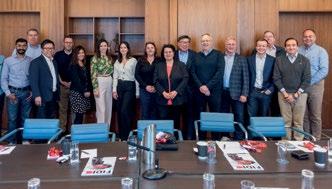


160 years of diplomatic ties between the UK and Portugal
€22.2bn
8,200
number of properties bought by ‘Golden Visa’
non-repayable EU support and loans to be given to Portugal (announced in 2024) 4.3% GDP increase in GDP forecast this year 4.3%

4,500 residence visas given to Chinese nationals (out of a total of 8,700 between 2012 and 2020)
A salesperson who ensures they are truly well informed about every aspect of their business can develop stronger partnerships and a more equitable relationship with customers. FIDI Secretary General Jesse van Sas explains why

When I started in this lovely business some 35 years ago, I got trained on the job.
This means that I had the privilege of witnessing two surveys done by an experienced salesperson, after which I was thrown into the deep end and had to face, and book, potential customers all on my own. I’m not sure this was the best methodology, but I survived and I’m still around today to tell the tale.
In our industry, we pride ourselves with onthe-job training, as the best way to educate new hires or existing staff members. Wonderful, and we should continue to offer this to our staff, as full immersion into the complexities of our business. It is our legacy, and there are great and sometimes hilarious stories to tell about this. Feel free to share yours.
But we cannot ignore the blind spots of this method. Our opponents (and, yes, procurement and HR are often opponents until we close the deal and they become customers or, even better, partners) are more and more sophisticated, and often way ahead of us in RFP negotiations and techniques.
They practise tactics that we are often unaware of, and which aim at getting top services for a minimal price, with almost all liabilities on the side of the providers, and the least possible commitment on the customer side.
We often complain about corporate customers or RMCs even, treating the movers or DSPs as mere ‘suppliers’, always ready to jump through hoops and bow to the requirements imposed by procurement teams. But if you want to develop
a real partnership with your corporate customer, and establish a more level customer-supplier relationship, then we need to up our game, and earn their respect.
We need to become more educated in sales, procurement and finances; become aware of how the land lies, and how we can best address these challenges. Not by gut feeling, or superficial and outdated knowledge, but by continuous training by specialists.
This business is under constant pressure to outperform in operations, to comply with the latest trends, to invest in technology, to respond instantly to any requests, and doing all that for the smallest margin, if there is a margin at all. The Q2 2024 results from our FIDI Global Business Confidence Barometer shows that costs are up and that movers are frantically trying to balance this in their sales prices (see article, page 29).
There is a famous Dutch song from the 70s, called How strong is the lonesome cyclist, in which the author sings: ‘How the businessman laughs with satisfaction and without compassion, who finds his competitor defeated, himself almost bankrupt.’ Let’s not be that businessman. Let’s move away from top-line revenue focus, get a true understanding of how P&L works and how it affects a balance sheet, learn to analyse financial documentation, and how payment terms affect the bottom line.
The FIDI Academy is not only investing in corporate sales training, but also in the basics of financial management. We need to learn how to swim faster, before getting into deep water.



Portugal has continually adapted to the challenges it has faced throughout the ages, with a collaborative international outlook that has made it an ongoing source of business for FIDI Affiliates in the country. Andrew Mourant finds out how the country’s moving businesses have thrived, despite the pandemic, Brexit, and recent restrictions to the immigration regime
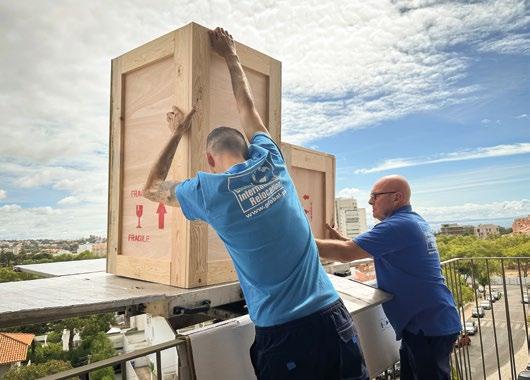

The global influence of Portugal, a slender country, the land mass of which covers western Europe’s extremity, belies its modest size. Borders defined by rivers and mountains have changed little since the 12th century, and with a seaboard stretching hundreds of miles –and being the birthplace of some of the world’s pre-eminent navigators and explorers – it has always looked outwards.
Conquests made from the 15th to 17th centuries turned Portugal into a great colonial power, before a catastrophic earthquake in 1755 laid waste to Lisbon and did much to snuff out the country’s overseas exploits. Since then, Portugal has survived a number of economic depressions, and even a fascist dictatorship, but has a habit of bouncing back.
Diplomatic bonds between the UK and Portugal stretch back 650 years. Last year, the two countries celebrated the Treaty of London, an alliance formed in 1373 between King Edward III and King Ferdinand and Queen Eleanor of Portugal, committing the nations to ‘peace, friendship and alliance’. Anglo-Portuguese relations were further underpinned in 1703 by the Methuen Treaty, a military and commercial agreement signed during the War of the Spanish Succession.
Portugal’s reputation these days is as a tolerant, outward-looking country, with its heart in the EU. The rupture of Brexit was felt keenly by the UK’s oldest
“We have strengthened partnerships with trusted UK agents to mitigate disruptions”
ally, culturally and commercially. However, the two countries moved swiftly to try to salvage what they could and, in 2022, they signed a bilateral agreement to explore opportunities in research collaboration, cooperation in education and science, business connections, tourism, and much else.
So, what of Brexit’s impact on removals? ‘It certainly added complexity to our trade with the UK, because of new customs regulations and administrative procedures,’ says Wesley Thomé, President of One Moving. ‘However, our expertise in international relocations has enabled us to navigate this.’
This sense of a Brexit burden is echoed across Portugal’s FIDI membership. ‘Despite the challenges, the UK remains an important trade partner for us,’ says Global International CEO Jorge Gomes. Meanwhile, Fábio Manuel, founder and CEO of Invictus Relocations, is making the best of the situation, having ‘leveraged experience and knowledge to adapt’. ‘We have also strengthened partnerships with trusted UK agents to mitigate potential disruptions.’
Portugal’s colonial past remains a big driver of removals. It was from Brazil – once the biggest







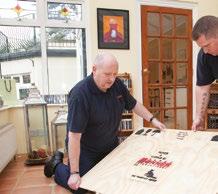





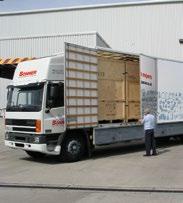


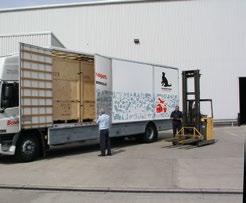

From whole house contents to cars, single items or pieces of art, no one is more careful than Doree Bonner International. We’ve been moving our customers’ possessions around the world for over 90 years - providing the highest standards of service at sensible prices.
For a free origin survey or destination rate, email us and get your clients move off to the ‘Purr-fect’ start. email: imports@dbonner.co.uk website: www.doreebonner.co.uk



Portuguese colony – that One Moving took over Premier International Movers in January. ‘Since acquisition, we’ve identified significant growth opportunities within Portugal and abroad, particularly Brazil and other former territories,’ says Thomé. ‘These regions continue to be significant two-way destinations for us.’
Manuel sees Brazil and other former Portuguese territories as ‘very significant’ in terms of two-way trade. ‘A shared language and cultural ties facilitate the natural flow of moving citizens and business transactions,’ he says. ‘Some former colonies
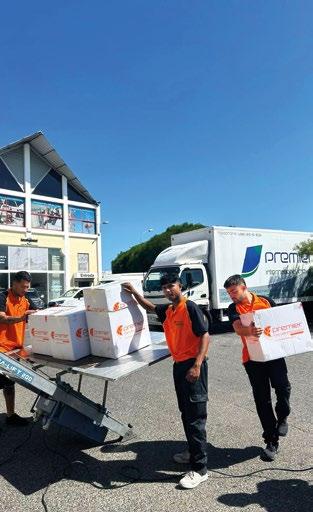
“We see emerging markets and the increased mobility of global workforces as key growth drivers”
experiencing different crises – whether political, crime or financial difficulties – see Portugal as their go-to country. A safe haven near the ocean becomes very attractive. They look for the proximity and a relatively easy immigration process.’
Thomé believes a detailed knowledge of Brazilian and Portuguese markets gives Premier International Moving its competitive edge. Primary areas of business include international residential relocations, fine arts transportation, corporate moves, and storage. The company is ever alert for fresh opportunities – ‘we see emerging markets and the increased mobility of global workforces as key growth drivers’, says Thomé.
For Invictus, the increased appetite for mobility services is driven by corporate expansions and the growing numbers of expats. ‘We’re focusing on key markets, such as the United States, South America, Australia, Europe, and Asia, where demand is increasing,’ says Manuel.
In 2012, having been buffeted by economic downturns – especially the global banking crisis – Portugal created its “Golden Visa” scheme in an effort to revive its fortunes. This granted residency to people who bought properties worth a minimum of €500,000 or who created at least 10 jobs in the country. Although plagued by bureaucracy and legal wrangles, the scheme has done FIDI members a power of good. Government figures released in 2020 claimed new arrivals had bought more than 8,200 properties and invested more than €500m. By far the greatest number of residence permits – 4,500 out of 8,700 –went to Chinese nationals.
Recently, however, Portugal began rowing back on the policy. ‘The most significant change is removing real estate purchases as a qualifying investment,’ says Gomes. ‘It’s likely to affect property demand, potentially reducing the number choosing Portugal via this route.’
He remains optimistic, however. ‘Other avenues –such as investment funds and company creation –remain attractive for foreign investors,’ Gomes points out. ‘Despite the changes, the country remains committed to supporting and attracting qualified individuals who follow the proper channels. These measures aim to prevent the influx of illegal immigration while ensuring Portugal continues to benefit from the skills and contributions of professionals who meet the necessary criteria.’
Global’s services range from international moves, relocation and immigration services to pet transportation and storage. ‘Recently, we identified significant potential in the niche market of fine-art transportation and museum installations,’ says Gomes. Making the most of that will, he adds, reinforce the company’s focus on strengthening its market presence within Portugal.
Invictus has also enjoyed a Golden Visa-driven boost. ‘Tightening the Golden Visa rules has had a mixed impact,’ says Manuel. ‘While it’s slowed down the influx of new applicants, it has also led to a more stable and sustainable market.’
One Moving has been adapting its strategy








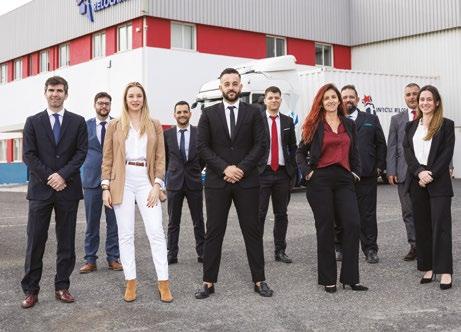
to cope. ‘We continue to see interest from overseas clients looking to Portugal for its quality of life and investment opportunities,’ says Thomé. ‘But immigration restrictions are likely to impact the ease with which international staff can move. However, our approach to planning and compliance ensures we’re prepared to handle these changes.
‘We’ve expanded our consultancy services. This includes offering tailored advice on alternative investment options that still qualify for the Golden Visa, such as rehabilitation projects in urban regeneration areas. We’ve also strengthened partnerships with local real estate experts, legal advisers, and financial consultants, to provide a comprehensive relocation package.’
One Moving is also targeting non-EU markets that still qualify for the Golden Visa, such as the US, Brazil, and various Asian countries. ‘By showcasing opportunities in Portugal, we help maintain a steady influx of relocations, despite the regulatory changes.’
The four-year economic recovery Portugal enjoyed after seven lean years was brutally derailed by COVID. The EU responded with its National Recovery and Resilience Plan, which, in Portugal, focused on the longstanding need to improve skills and increase competitiveness, plus other priorities, notably climate and digital transitions. In July 2024, the EU announced that Portugal would receive €22.2bn in non-repayable support and loans – 10.7 per cent of the country’s 2019 gross domestic product (GDP). That said, a resurgent tourism industry was – and still is – driving recovery, with GDP growth projected at 4.3 per cent this year. In fact, GDP has been rising since 2022.
For FIDI members in Portugal, as elsewhere, COVID triggered emergency measures and improvisations that are now standard industry practice. ‘There’s been a shift towards greater flexibility in scheduling and service delivery, to accommodate health and safety concerns,’ says Thomé. ‘The pandemic has highlighted the importance of adaptability.’
Digital is here to stay – virtual surveys and consultations to reduce physical contact are ubiquitous. ‘The pandemic also heightened the importance of hygiene and sanitation, leading us to adopt more rigorous cleaning protocols,’ says Gomes. ‘These remain in place.’
It’s much the same at Invictus, where virtual surveys that ‘became essential’ offer ‘enhanced convenience and operational efficiency’. The firm’s dash towards new technology now includes using AI-driven logistics management systems. ‘The pandemic also highlighted the importance of adaptability,’ says Manuel. ‘We’ve become more agile. The ability to adapt has strengthened our resilience and preparedness for future challenges.’
Research conducted last year by the Spanish bank Caixa declared that Portugal’s labour market has now entered ‘a golden age’ - ‘the unemployment rate at rock bottom… job vacancies at a peak.’ However, the difficulties FIDI members face in recruiting good staff anywhere in the world are well documented.
‘Attracting new talent can be challenging, but also presents an opportunity,’ says Thomé. ‘The working culture here emphasises a strong balance between professional and personal life, which appeals to many. We focus on continuous training and career development to attract and retain skilled professionals.’
Global International makes a point of setting out its stall to prospective employees. ‘We don’t just rely on the market – we showcase career opportunities,’ says Gomes. ‘Our benefits package includes psychological support, transportation subsidies, or monthly happy hours.’
Invictus promotes the ‘dynamic and rewarding nature’ of the work – from logistics and operations to customer service and sales – appealing to ‘a wide range of skill sets and interests’. ‘In Portugal, the working culture is characterised by a strong sense of community and collaboration,’ says Manuel. ‘We emphasise teamwork, provide employees with training and development, and highlight opportunities for international exposure and cultural exchange –employees can work with clients from around the world, gaining valuable insights and experiences.’
Manuel is keen to differentiate between the established strengths of FIDI members and the ‘recent influx’ of new moving companies trying to get a foothold in the domestic market. ‘It’s crucial to understand that Portugal presents unique professional
Portuguese Affiliates
INVICTUS
GLOBAL RELOCATION
PREMIER INTERNATIONAL RELOCATIONS
and cultural challenges that many [industry] newcomers may not be prepared for,’ he says.
‘Setting up a business here, particularly in relocation, is far from straightforward. Navigating the bureaucratic landscape requires not only patience, but also a deep understanding of local regulations and licensing requirements.’ Companies operating without licences and business permits ‘not only undermine the integrity of the industry, but also pose significant risks to customers.’ Often, Manuel adds, they lack professionalism and accountability.
‘Cultural nuances in Portugal demand a level of adaptability and respect that can only be acquired through experience. Misunderstandings can arise easily, and without a solid grasp of local customs and expectations, new businesses may struggle to establish trust and rapport with clients.’
The Portuguese relocation market should be approached with ‘bravery and diplomacy’. ‘Success requires more than business acumen,’ Manuel says. ‘It demands a commitment to understand and integrate into the culture. It’s not for the faint-hearted.’
“Some former colonies experiencing different crises see Portugal as their go-to country – they look for the proximity and a relatively easy immigration process”
AFFILIATE LISBON
AFFILIATE FARO, LISBON AND FARO
AFFILIATE LISBON

Customer Relations Manager Lydia Cope looks at the latest movement on FIDI’s measure of confidence in the international moving industry
The quarterly FIDI Business Confidence
Barometer, based on input of well over 160 FIDI Affiliates, has turned positive again - although ever so slightly.
Analysing the figures, the market remains still rather negative on the top-line revenue and bottom-line profit in Q2, but does see a considerable increase in prices, to cover for the raised costs in operational moving.
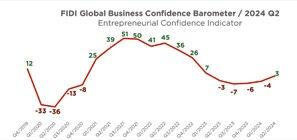
Jesse van Sas, FIDI’s Secretary General, says: ‘When we look at the expectations for the coming months, we see a very modest improvement on revenue and related profit coming into the equation. However, continuous rising costs remain a concern. To me, this shows that the industry is not out of the woods yet, but there are some hopeful signs. FIDI Affiliates seem to be faster and more determined in adapting prices with the rising costs. That is different from what has happened in the past.'
Launched in 2019, a few months before the COVID pandemic, the FIDI Business Cycle Barometer compares figures for the current quarter against the same quarter the previous year and asks FIDI Affiliates to share their expectations for the upcoming quarter, compared to the same period last year.
You can download the yearly FIDI Business Cycle Barometer reports on FIDI’s publication page: www.fidi.org/publications page
For more information about this project, please contact Lydia Cope at lydia.cope@fidi.org

The harder you work, the luckier you get’ was the oft-quoted sales mantra, but – for people in the sales industry today – it’s not just about putting in the hours.
Since the 1990s, the market into which most companies are selling their services has completely transformed. Factors include the increased influence of RMCs on the corporate market and the use of technology, which means moving companies have reduced interactions with some end clients. Meanwhile, clients are more price sensitive than ever and volumes of household goods continue to slide. Traditional sales approaches often no longer work.
Wiebe van Bockel, Chief Commercial Officer at Voerman in the Netherlands, is a veteran of sales and believes the industry is overly ‘hardwired’ towards operations. This can deter talented salespeople from joining – at a time when moving companies really should be embracing new and creative approaches to reaching customers.
‘When I started, corporate sales were really a big thing,’ recalls Van Bockel. ‘In the 1990s and 2000s, we had a lot of good corporate salespeople who were welltrained, highly educated, and well positioned in this industry. We had direct contact with corporate clients… and the margins were there to support sales activities.
With the international moving industry facing ever higher pressure on margins, Affiliates need good salespeople to build strong relationships with customers. However, over the past three decades, a great deal has changed about what –and how – we are selling. Andrew Bennett looks at the challenges facing moving companies and seeks out advice for those who want to upgrade their game

‘The 90s were “old school”, so most sales were traditional. When I look back, clients were interested in seeing you if you came up with solutions for them.’
But then, he says: ‘All of these things disappeared. It’s a big statement, but I don’t think any large corporate client is interested in our service on its own any more. They say: “OK, you do moving, that’s great” … it’s a given. In the past 20 years, RMCs have come in and they took a lot of that space and, as a result, a lot of moving companies let their investment in sales go.’
Rob Gilbert, CEO of Oman Beverly Smyth in the Republic of Ireland, says the industry’s sales approach to customers has changed little for generations.
However, he adds: ‘Things have morphed into something almost unrecognisable to the contemporary salesperson. Beyond a conversation, competence is not just an expression of confidence based on longevity in the marketplace, it’s a visual portrayal of an experience with vivid imagery dispatched from a desktop marketeer to our potential client’s phone.
‘Now, because everything has changed – and seemingly all of a sudden – I do hope my view on this isn’t just because I am more mature; at least with the methodology of client acquisition, we are being thrust into steep learning curves – much steeper than our predecessors.’



At the FIDI office, Secretary General Jesse van Sas has a background in moving industry sales and was general manager of Santa Fe Relocation Services in Belgium before joining FIDI. He believes too many Affiliates may still be focused too often on transactional sales.
‘I truly believe FIDI Affiliates, as a whole, have great sales staff; they are very dedicated, professional, and very passionate, but they are not necessarily specialists in corporate selling.
‘Corporate customers are far more sophisticated today… they were becoming this way 10 years ago, but are even more so now. Back then, you would sell to the HR or mobility person, who had direct contact with the expat and had an emotional connection with the mover and the assignee.
‘Nowadays, you are selling to procurement people, which is a totally different ball game.’
Simon Hood, Executive Director at John Mason International in the UK, cites other reasons why the sales environment has changed so much.
‘Our customer base has diversified, with more private individuals and younger families looking to move abroad for various reasons,’ says Hood.
“The stakes are higher now. You need to be on top of technology, on top of the game on sustainability, for example”
‘The industry often struggles to resonate with these new demographics, particularly as they are tech-savvy and expect seamless digital interactions.
‘We know that many FIDI Affiliates struggle with technology – this was obvious when FAIM audits had to go back to physical audits after COVID-19, as some Affiliates were not digitalised. They need to adapt quickly to meet these expectations or risk becoming obsolete.’
Van Bockel says: ‘There are just a handful of international moving companies globally that can sell to global clients and global contracts… Back in the day, there were dozens of companies doing that. Now, no more than 10 or so are selling global solutions to large global clients.’
He would like to see a renewed investment in sales and marketing, focused in the right way.
‘The investment in sales and marketing across the industry is going down rather than up. Attracting young people who want to take that next step in

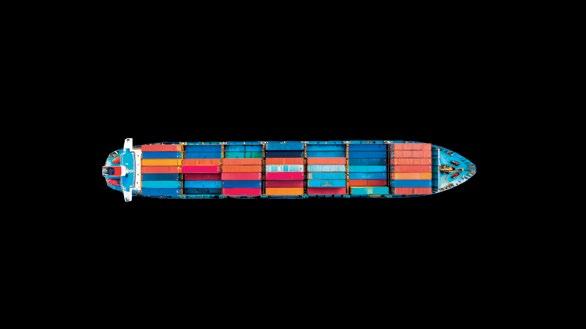


sales is also a challenge… In our company we have a handful of people who are open to opportunities, are hungry and learning.’
Private consumers are, for many Affiliates, an increasingly important sector of the market.
Compared with corporate customers, who are usually harder to access, moving companies can deal with them directly.
Hood, from John Mason, says: ‘Private customers are incredibly influential these days. They form a significant portion of our customer base, and their upfront payments are great for cash flow.
‘They’re not particularly hard to reach, but Affiliates need to ensure they are marketing effectively to them.’
Private customers are key, he adds, because their reviews and recommendations generate high-quality sales leads. ‘Engaging with them through personalised marketing strategies and maintaining an active online presence is essential,’ he says.
Van Bockel says this a market where a more traditional ‘transactional’ sales approach can work.
‘There are benefits to these types of sales; it is money up front, it is a one-time transaction …Consumers are
a little more focused on customer service than price, although they are still price sensitive,’ he says.
‘There is still the ability to sell services to a consumer, whereas approaching a corporate client is becoming more and more difficult – there is a big drive on cost only.’
FIDI’s Van Sas believes private customers need a local and transactional approach, in contrast to most corporate customers.
‘Private customers are often actually corporate customers, as they have received that lump sum for their moves… so, very often, they are actually corporate assignees.’
‘The channels to get to the customer are more subtle than ever before,’ adds Gilbert. ‘Marketing is a bigger part of the budget; the deployment of humans in the sales budget is becoming less, but the skills are even more demanding, even at a premium.’
With procurement departments at corporations usually calling the shots, and RMCs often controlling access to larger corporate accounts, smart and effective thinking is needed.
Van Sas believes moving companies may






















benefit from seeking external sales training, especially in terms of dealing with corporate clients and their procurement teams.
‘These guys are exceptionally well organised and will make life difficult… they accept your business through a methodology of getting you down to the lowest possible price… that is their focus,’ he says.
‘If you are not trained to counter that, you will lose out. You will either not book the business, or book it on very different terms from those you were suspecting or at rates that are not sustainable.’
Van Bockel believes there may be an opportunity for movers to renew a relationship with bigger clients, as long as they can offer effective modern solutions that fit the client’s agenda.
‘To be in the game, the stakes are higher. You need to be on top of technology, on top of the game on sustainability… you need to prove what are you doing… clients are looking at your EcoVadis certificate and asking about your long-term strategy in terms of sustainability, and asking: “How are you going to help us in the long term?”
‘But they want us to help them with their problems. They focus more on the compliance side… on the cost
“No more than 10 or so are selling global solutions to large global clients”
side, that is the other big thing – how can you help to drive costs out of the programme?’
Despite a very tough environment for moving companies to sell into, there are still opportunities for smart salespeople to make an impact, with the right approach.
Oman Beverly Smyth’s Gilbert gives this closing thought: ‘Communicating and talking engagingly is becoming a premium skill. Particularly when bots [web robots] are being allowed leeway to take over.
‘Bots doing the selling is like having a bicycle without any handlebars: sure, we can learn to balance, but how do we know where we are going? Where is the passion for the business?
‘The customer then becomes secondary to these bot companies, as it is the process that is more important, and engagement slips on the list of priorities.’
l The FIDI Academy has launched a new sales training programme. Find out more on page 40


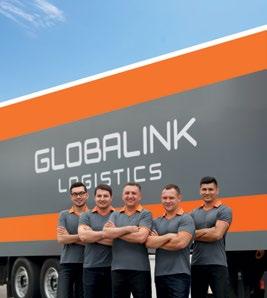
“An ‘always be closing’ attitude will set your company apart from the herd”
Tips for the modern salesperson ‘Try to be unique’

Maarten van Zutphen, CANI Management & Consultancy
‘Set clear goals throughout sales and operation to ensure full focus. For sales, a smart combination of the number of moves booked, competitive margins in line with the company’s cost structures, and gross revenue should be important drivers.
‘Connect these goals well with the operational side of the company, as everyone should feel good about the quality delivery of the services being sold. Company leaders should anticipate the situations that will arise.
‘Telling a sales representative to simply slow down on booking should be avoided.’
‘For corporates, build and nourish relationships and ensure that you can continue to show your company’s added value. Be smart in using LinkedIn, understand the dynamics at the corporate (mapping out the decision-makers) and ensure you become a “must contact” source for their moves to be tendered.
‘When selling to private customers, ensure a good mix of lead generation, preferably through your own webpages. Never lose momentum. The moment a private customer contacts you, call immediately and use the skills learned to convert the lead into a booking.’

‘Listen more than you talk - understanding your customer’s needs and concerns is the first step in building trust.
‘Be transparent - clear pricing and honest communication about what to expect go a long way.
‘Leverage digital tools - use CRM systems to keep track of customer interactions and preferences.
‘Show empathy - moving is stressful. Showing that you understand and are there to make it easier builds loyalty.’

Jesse van Sas, FIDI Secretary General
‘While moving staff can do courses in sales, you may also like to do a course in procurement. What you learn will help your sales approach towards corporate customers.
‘Our industry tends to make the best salespeople sales managers. This rarely works, and often backfires, as the best salespeople are not always the best people managers.
‘Also, have a sales methodology, be consistent in your approach, seek training, and understand procurement.’

Rob Gilbert, Oman Beverly Smyth
‘Get people who can pick up the phone, are not afraid to talk, to sell – over the phone, via email or social media engagement – a quality margin-driven service. Engagement is everything.
‘If you can get “closers”, if you have people with an “always be closing” attitude, then your company is set apart from the herd. Create a desire for the client to want to be a referral, then you’ve struck gold.
‘If you need practice at being a better salesperson, talk to teenagers. If they talk back, you’re winning!’

Wiebe van Bockel, Voerman
‘For smaller companies, choose your market and segment and make a difference by creating a culture of sales. This means being openminded to customers – “the answer is yes”.
‘Don’t try to copy and paste what others are doing; try to be unique. While it’s good to look at your peers, look at salespeople and what they do in other service industries.’

Australia’s largest branch network, offering complete moving and mobility coverage from coast to coast since 1911. Australia. Think Grace.

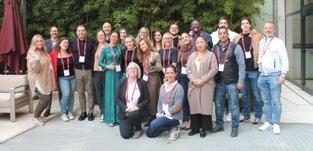

Following last year’s successful pilot DSP seminar in Milan, the FIDI Academy will run an extended second DSP programme in Vienna in February. FIDI Academy Manager Chantal Fera tells us what we can expect, including useful new content that has been added for 2025
The pilot of FIDI Academy’s DSP seminar took place at the end of November last year, in Milan.
Held in the city’s Navigli waterside area, the intensive three-day course featured many interactive, hands-on activities that allowed participants to network and, in true FIDI Academy tradition, make lifelong connections and friendships. Among those who attended were CEOs and owners who want to expand their business into destination services, and DSP consultants who provide services to company clients.
The programme was delivered by Lead Trainer Sara Lyrum Kronkjaer and her team of Andreas Eibel, Kim Ngoc and Robert Cormier, who brought different training styles and a wide variety of personal experiences to share.
The course covered the five core DSP services that the FIDI DSP module certifies: orientation, home search, school search, settling in, and departure services. It included first-hand experience from guest speaker Maria Molteni, who spoke about the real impact a DSP consultant can have on the relocation experience – with an emphasis on exceptional customer service and managing expectations.
There was also a session on visas and immigration (V&I), by Stefano Pacifico, an expert from ECA Italia,
l Opening dinner: Sunday 23 Feb 2025
l 4-day seminar: Monday 24 Feb –Thursday, 27 Feb 2025
l Final evening dinner: Thursday, 27 Feb 2025
l Departure: Friday 28 Feb 2025
Investment: €2,950 (including 5 nights’ accommodation, F&B)
Target audience:
l Relo consultants
l Relo coordinators
l Salespeople
l New hires in the relo business
l Anyone involved in the relo business
who explained the importance of understanding local V&I rules when managing a relocation.
During the three days, everyone also had the opportunity to build on their creative and presenting skills, developing their soft skills in addition to learning the subject matter. After the final exam on day three, the seminar closed with a formal dinner and a fun night out in Milan.
The Academy has incorporated feedback from this event into the next DSP seminar, which will take place in Vienna in February 2025. The event has been extended from three to four days to allow more indepth discussion and interaction with guest speakers and participants. It will also include role play to help participants deal with challenging situations with transferees, corporate accounts and suppliers.
Next year, we are also including an orientation tour in the centre of Vienna and will look at the budgets –which may be an eye-opener for students from other continents. We are also aiming to meet with the director of a local international school to discuss the challenges faced by transferee children.
This four-day seminar is a must-attend for FIDI Affiliates who want to diversify into relocation and global mobility, or for FIDI Affiliates who are planning to apply for the FIDI DSP certification.
Content: A full 360° approach to the relocation process (HR, mobility desk, corporate account, RMC, transferee and service providers perspectives). You will hear from visa and immigration specialists, HR specialists, mobility desk representatives, and RMCs, and a nomad worker will explain to you the challenges they face when moving abroad with their family.
l DSP history and overview
l FIDI DSP quality seal
l Your customers - who they are and how to sell to them
l The HR-mobility desk objectives
l Deep dive into the transferee experience
l Needs assessment
l Orientation tour and field visit
l Home search, lease negotiation and field visit
l School search
l Settling in and departure services
l Cost of relocation and bundle fees
l Soft skills (individual values vs cultural values, interpersonal communication)
For more information or to book your place on the next FIDI Academy DSP Seminar, please contact Chantal Fera at: academy@fidi.org


FIDI 39
Stouffer on why forward-thinking companies regard ‘sales’ as so much more than merely securing businesses

Everyone is in sales.’ I am sure we’ve all heard this phrase at some point, used in the rather limited sense of bringing in new business leads for the company. However, there is a broader sense of selling that can – and should –mean so much more to our industry.
At our core, we are an industry that has experienced very little change to the basics of our business. We are movers. We pack items for transit, coordinate their movement overseas, and deliver to a destination. That’s the way it’s been since the first moving company opened its doors. What has changed, and what will continue to change, are two things: the technology used to complete our work and the people doing it.
Will we embrace technology at the pace needed to stay ahead of the competition, and will we continue developing talent at all levels? Both are needed to sell and grow a business effectively.
Technology is a sales tool that needs to be adopted at all levels, not just for reaching the end customers. Websites are crucial, but can often be overlooked. From a prospective customer looking to hire services to a potential employee before applying for a job, a company’s website is the first – and sometimes only – chance for a business to make an impression. If your website still looks like it’s from 1990, then good luck attracting buyers or employees born after that. It’s not only about the look of the site, but also the functionality. What kind of interface/user experience does it offer? Does your website yell: “This is a company on the up!”?
technology that expedites and simplifies the packing process for crews.
Continued investment in technology is a clear signal to your staff that you are looking to the future. Not investing is failing to sell the company to staff as a place that holds a future and career path for them.
When it comes to talent, one of the most important sales agreements is the successful hiring of promising new recruits. You have highlighted your company’s offer as a promising place to work; the applicant has sold their skills and what they can contribute to the organisation – a win-win sale on both sides. But the sale doesn’t stop there. Getting people through the door is only step one in a company where everyone is truly in sales. Ask yourself the following:
Has your company invested in accessible and ongoing internal training for all employees? If the answer is yes, your HR team is doing its part to sell the concept of talent development and investment in people.
Is your company technology keeping pace with the market? Are you fully digitalised? Have you ensured your cybersecurity is up to scratch? If the answer is yes to any or all of these, your IT department is selling the idea to the rest of your organisation that this is a company that will keep up with the future of the industry and not be left in the dust.
Is your company making commitments to corporate social responsibility initiatives, such as sustainability? If so, company leadership is selling the stance that this is an organisation that welcomes the challenges of an ever-evolving global business environment, and is willing to embrace the change needed to move forward, rather than turn a blind eye to it.
“Continued investment in technology is a clear signal to your staff that you are looking to the future”
The same general principle applies to office and field technology. Today, there is an expectation that companies will offer a certain level of sophistication; those that do not may find it increasingly difficult to sell themselves and their services.
Employees – especially younger workers – want to use tech that works for them. For example, a move management system that streamlines processes and workflows, rather than adding to them; or inventory
If you are truly selling at all levels and departments of your firm, the result will be a workforce that will naturally sell the company to the outside world without thinking. In this model, companies create a culture of which people want to be a part, leading to better retention, higher levels of experience in all roles, and a better customer experience. When you take pride in the environment in which you work, it becomes abundantly clear to those with whom you interact outside the company. From there, you can put things in place to enhance your external sales organically, such as employeereferral plans, and prize raffles for leads generated by employees (rather than paid for by third parties).
To sell our industry effectively, we need participation from companies in all regions, at all staff levels, in all roles. FIDI provides a solid foundation and roadmap for us to follow in terms of best practices, but we need every employee of a FIDI-affiliated company to be in sales, promoting the past, present and future of this industry.
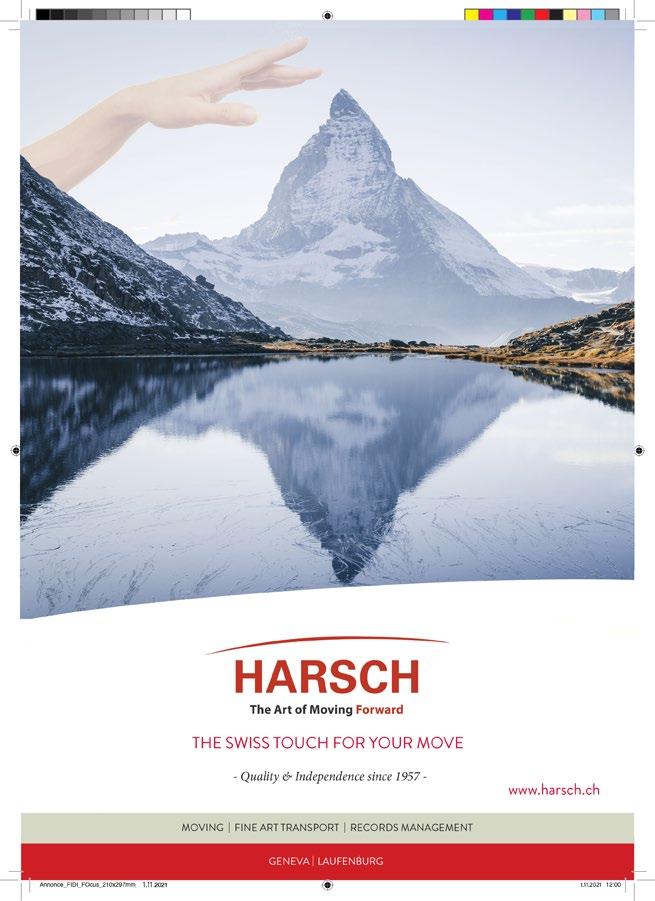



From the influence of Boomers to Gen Z, FIDI 39 Club Vice President Juan
Guillermo
Díaz looks at the evolution of the moving industry sales playbook over the years
The international moving industry offers a unique window into the evolving world of sales strategies. As we explore the diverse approaches of Boomers, Gen X, Millennials, and Gen Z, we uncover a vibrant mix of innovation and adaptation. These generations have shaped – and continue to shape – the industry with their distinct styles and savvy strategies.
In the early days of the international moving industry, Boomers ruled the roost, relying on face-to-face interactions and door-to-door sales. Personal rapport and trust were their currencies, building relationships that could last for years. Deals were sealed with a handshake and a promise. Despite the charm, Boomers faced the challenge of limited technology, making communication slow and labour-intensive.
Next came Gen X, bridging the gap between traditional methods and the digital age. Growing up with the first personal computers and the internet, Gen X-ers valued the personal touch, but began integrating emails and early internet marketing into their strategies. They adopted data-driven decisions and early customer relationship management (CRM) systems, to streamline operations. While Boomers and Gen X shared a foundation of trust and relationship-building,
Gen X introduced efficiency and a tech-savvy approach.
Millennials and Gen Z share a digital-first mindset, but differ in their methods. Millennials mastered websites, social media and digital advertising, turning content marketing into an art form. Blogs, videos and social proof (reviews and testimonials) became their go-to tools. Personalisation was key; they understood the power of tailoring services to individual needs.
Gen Z, meanwhile, took the digital game to a whole new level. Born into a world dominated by smartphones and social media, Gen Z sees platforms such as Instagram, Linkedin and TikTok as essential sales channels. They are the social pioneers, leveraging influencer partnerships and authentic, relatable content to drive engagement. Real-time communication is crucial for Gen Z, with chatbots, instant messaging and rapid responses becoming the norm.
Despite their different approaches, Boomers and Millennials both emphasise building trust and personal relationships. For Boomers, this meant face-toface interactions and long-term relationships. For Millennials, it translated into personalised digital experiences and tailored communications. Both generations understand that trust is the cornerstone of successful sales, albeit through different media
Gen X and Gen Z both value efficiency, but use different methods. Gen X introduced efficiency through data-driven decisions and early digital tools, streamlining operations while maintaining a personal touch. Gen Z, on the other hand, focuses on real-time engagement and quick responses, using advanced technologies such as artificial intelligence (AI) and chatbots to meet customer demands instantly. Both generations prioritise speed and efficiency, but their tools and approaches reflect their unique technological landscapes.
Adaptation is a common thread across all generations. Boomers gradually incorporated early technology, while Gen X seamlessly blended traditional and digital methods. Millennials embraced the digital revolution wholeheartedly, and Gen Z continuously push the boundaries with new technologies and social platforms. This willingness to adapt and innovate ensures the industry evolves to meet new challenges.
To succeed in sales today, it’s crucial to blend the strengths of each generation. Here are some recommendations on how to create a strategy that leverages the contributions of every generation, with examples from trending industries:
Build trust and personal relationships: Combine Boomers’ face-to-face interactions with Millennials’ personalised digital experiences. In the luxury realestate industry, agents blend personal client meetings with high-quality virtual tours tailored to individual preferences, creating a seamless and personalised experience. In our industry now, we can find virtual software that allows a close interaction with clients during the survey process.
Embrace technology efficiently: Follow Gen X’s lead by integrating data-driven decisions and digital tools. Use CRM systems to keep track of customer interactions and preferences while maintaining a personal touch. The healthcare industry uses sophisticated CRM systems to manage patient relationships, ensuring personalised care and efficient service delivery. In the moving industry, CRM tools were developed for our specific needs, saving time. Leverage digital marketing and content creation: Adopt Millennials’ mastery of websites, social media and digital advertising. Invest in content marketing – create engaging blogs, videos and customer testimonials that resonate with your audience. The fashion industry excels at this, with blogs and user-generated content to build a loyal community. Time passes by and companies in our industry are creating these channels well. Improving engagement with potential clients, nowadays is a must. Something we aim to do with FIDI Focus content. Use social selling and real-time engagement: Follow Gen Z’s example by embracing social media platforms and real-time communication tools. Use Instagram, TikTok and chatbots to engage with customers instantly, ensuring quick responses and seamless experiences. The beauty industry uses social media influencers and real-time interactions to drive sales and build brand loyalty. These elements can be considered a trend inside our industry; we are increasingly creating close relationships with influencers and public figures to increase market visibility.
Adapt and innovate continuously: Encourage a culture of continuous learning and adaptation. Stay updated with emerging technologies and be willing to experiment with new platforms and strategies. The tech industry, with companies such as Apple and Google, constantly innovates and adapts to new trends and consumer behaviours, setting benchmarks for continuous improvement.
Focus on personalisation and customer experience: Combine Millennials’ personalised approaches with the efficiency of Gen X and the realtime responsiveness of Gen Z. Tailor your services and communications to meet your customers’ individual needs. The travel industry uses AI to give personalised travel recommendations and real-time customer support, enhancing the customer experience.
Balance traditional and modern methods: Blend traditional methods that work with modern techniques, to create a holistic sales strategy. In the automotive industry, car dealerships combine traditional test drives and face-to-face consultations with digital showrooms and online customer support, to cater for a wide range of customer preferences.
These last three recommendations should be a core focus for our sector. By integrating them, the international moving industry can create a sales strategy that honours the contributions of every generation, ensuring a dynamic, efficient and customer-focused approach. It must continue to embrace change and innovation. Understanding generational differences and leveraging the strengths of each can lead to more effective sales strategies and a better customer experience.
The journey doesn’t end here. We must stay agile, open to new technologies, and ready to adapt to an ever-evolving landscape. In international moving, change is the only constant. By learning from the past and embracing the future, we can navigate the challenges and seize the opportunities that lie ahead. Selling is a beautiful art form. Share your experiences, stay curious, and let’s move forward together.
l If you would like to share your ideas with the FIDI 39 Club, please email 39club@fidi.org

“Understanding and leveraging generational differences can lead to more effective sales strategies and a better customer experience”
Articles and books to deepen your understanding of sales and refine your strategies: Influence: The psychology of persuasion by Robert B Cialdini: A classic book that delves into the principles of influencing and persuading customers.
The challenger sale: taking control of the customer conversation by Matthew Dixon and Brent Adamson: Insights into how salespeople can challenge customers’ thinking and add value to their decision-making process.
Marketing 4.0: Moving from traditional to digital by Philip Kotler, Hermawan Kartajaya, and Iwan Setiawan: A comprehensive guide to integrating traditional and digital marketing strategies.
Jab, jab, jab, right hook: how to tell your story in a noisy social world by Gary Vaynerchuk: A practical book on mastering social media marketing and engaging audiences effectively.
Digital marketing excellence: planning, optimising and integrating online marketing by Dave Chaffey and PR Smith: A detailed resource on developing and implementing successful digital marketing strategies.

Despite being an exciting, fast-paced, diverse and rewarding industry with a broad international reach, the moving industry still has work to do in communicating these benefits to prospective employees. FIDI Focus Editor Dominic Weaver spoke to representatives of four parts of the business to find out what companies can do (and are doing) to ensure that potential new hires consider a career in the sector – and stay once they get here
Marcel Jörg, FIDI Board member and CEO of Gosselin, a business with experience of recruiting younger people
“Young people who can earn a lot of money quickly value time over money”
To begin with, we should address the fact that recruiting for blue-collar positions in moving is more difficult than white collar. Driving is a recognised profession, of course, but when you add the moving part – the packing and unpacking – you’re looking at a different kind of recruit. With companies such as Amazon paying higher prices for less-demanding work, it can be hard to get talented, hardworking people into that part of the industry. This is what worries me most.
I don’t see how technology will help us here in the short term. It can help with inventories, and in other areas, but you must lift things up and carry them down the stairs at some point.
The current generation of immigrant workers are ageing, with their children more integrated, speaking the language better and often looking for a profession.
To make these roles more attractive, we are trying to shift away from longer jobs – where crew are away from home for two weeks, which fewer people want to do these days – and putting things on rail instead.
White-collar recruitment
For white-collar roles, we have an extreme example in Switzerland. There are so many opportunities for young people, who can quickly earn a lot of money and so value time over money. They prefer having more holidays and a lower salary, and can afford it. In Eastern Europe, we don’t see this to the same extent - people may take another job on the basis that it pays a hundred euros more a month.
It’s clear that you can’t put all young people into one pot and say “this is what they are like”. You can, however, put in place certain programmes to attract and retain them.
As a company, we have workshopped the attractiveness of our business to younger and older employees. We now offer packages that focus on time over money; where loyalty to the business is rewarded by giving office staff eight weeks holiday, instead of their usual five weeks, every
three years. Staff must take this additional allowance in one go and actually disconnect, to go somewhere and do something else - be off their emails and away from work. Staff can also visit company headquarters for a week to experience the impressive operations there; this isn’t always visible when they are working in a branch.
We actively sell the international aspect of our business, celebrating the fact that they can go to another branch and work there for a period – and we have asked our agents in other countries to host our staff on placements on a case-by-case basis. Gosselin’s operations span 34 countries, so this is a significant further perk for employees.
Working at home is, of course, popular too, and, since the pandemic, we offer two days a week as standard, with some fully remote and only coming into the office for meetings.
There aren’t many industries that offer what we do for people who like languages, who like to travel, who like the international flare. We work with a large global network of people, which has huge appeal – and I think we sometimes underestimate the value of that.
Here in the countryside in Bern, our competitors for staff are Swiss Post or Swiss Railways, telecommunications provider Swisscom, and federal organisations – which don’t offer much from an international point of view. We can really leverage that. Even in our own office we speak multiple languages and have people from all over the world. We are quite diverse, and that is an attractive thing for many people.
Industry associations can play a role. Perhaps they could present the industry at the end of university courses or the baccalaureate. Social media campaigns would be welcome, too.
When we’re recruiting for our companies, we don’t always push these huge benefits. Of course, we must remember that there are also more routinebased roles – such as doing quotes, and tariffs and billing – which are not exposed to the international side, so don’t have this advantage.


Steve Maples, Chief Talent Alchemist at Alchemy Global Talent Solutions, a recruiter working for the moving, relocation, global mobility, shipping, and fine art industries
“Employees look for forwardthinking companies that support clear career progression and continuous personal growth”
I’ve seen first hand how critical it is for companies to adapt to the evolving expectations of their workforce. Embracing change is not just about staying competitive.
The landscape of work preferences is shifting; candidates now prioritise flexibility, often seeking remote or hybrid setups. To stay competitive, employers must embrace new working models that allow employees to manage their personal and professional lives more effectively, expanding their talent reach beyond local geographies and boosting productivity.
Work-life balance is more important than ever, necessitating fair work schedules and solid support for mental health; businesses that can provide this will attract top talent.
Allowing opportunities for learning and development is essential. Employees look for forward-thinking companies that support clear career progression and continuous personal growth through training and advancement opportunities.
Having an ethical business practice is vital. Organisations that show their values and are committed to being ethical are more appealing to potential hires. Showcasing the culture and ethics of the company through testimonials is an effective way to attract new talent.
Salary packages that are eye-catching and comprehensive are essential. Top talent can be retained by ensuring that remuneration is attractive through regular salary reviews. Companies can keep competitive by comparing their pay with the industry norm.
Having access to state-of-the-art technology is important, too. Investing in the best tools increases productivity and assists staff in strengthening service delivery and client satisfaction.
Invest in your people to secure long-term success. In today’s competitive job market, companies that prioritise ethical values, professional development, workplace flexibility and a supportive environment will stand out. Embrace change now to position your business as a forward-thinking, attractive organisation.
l Allow flexible work arrangements
l Support the mental health of employees for a better work-life balance.
l Provide clear paths for career development and progression
l Showcase the core values of the company with endorsements.
l Offer competitive compensation packages
l Invest in technology to support and boost productivity.

Steve Jordan
Steve Jordan, The Mover magazine
“We should search for people who understand the human condition, in whatever role they work”
We have some fabulous young people working in our industry already. We should really celebrate the people we have first – and make sure, as a consequence of this debate, nobody feels as if they are not good enough to represent the future of the industry.
Our people should have the right qualities and attitude. Anyone can learn to be a packer, a fleet operator, a salesman, a coordinator or a manager – but you can’t teach people empathy, understanding, care for others, the desire to serve, or the drive to work hard. We should search for people who understand the human condition, in whatever role they work, with qualifications being of secondary importance.
Good people will usually have a choice about where they work, so we must ensure we make the workplace right for them. This is not hard: you just need to be flexible when you can, listen to them, empower them, trust them, give them credit for their ideas and successes, allow them to make mistakes without fear, help them understand their importance as part of a

successful team, and provide a clear career path. Money matters, but not as much as these other things.
Get it right and every employee will become an advocate for you, and help you to recruit the best people.
Treating staff well, paying them properly and caring about them are not incompatible with commercial success – they are fundamental to it.
We should invest in specific management training to help managers get the best from their people and recognise and channel talent where it exists.
The industry has driven itself down to become a commodity over the past 30 years or so. It needs to reverse that by investing in professional salespeople, training them well in the techniques they need to succeed and allowing them to start driving up revenue again. That way we will be able to afford to pay people better and save them from migrating to other sectors in search of more money.
We have, forever, told the world that moving is not a sexy business. But it is. It allows interaction with people who really need help, enables us to mix with multiple cultures, and offers opportunities for international travel for some. Done right, by the right people, it can provide tremendous job satisfaction – we should stop telling people otherwise. I would not have stayed in this business for more than 50 years if it were boring.
Jackie Stouffer, VP, International, Global Move Management at JK Moving and FIDI 39 Club President
Irecently had the privilege of hosting a panel about talent retention at the FIDI Conference in Edinburgh. There are countless views and points to be made, but here are some I feel warrant a closer look.
The first is where and how we are looking for talent. For administrative roles, we seem stuck on university degrees as a qualifier, when, realistically, a degree probably does very little to prepare you for this unique business.
FIDI 39 Club Board member Sonja Tuomela sums it up nicely: ‘Moving is not rocket science - the key is to find employees who fit your company and your team. Forget fancy university diplomas and get creative in how you seek out the competencies needed to do an amazing job.
‘Listing personal attributes rather than requiring university or college degrees might open doors to new or hidden talent pools, allowing you to find employees that suit the company culture as well as the job title. I have learned so much more from doing the job than from my Bachelor’s degree.’
I echo Sonja’s thoughts. Speaking as a college graduate who got a D in university accounting – a skill we’d all agree is pretty important in business – what you learn from university books can have little to no impact on your actual job performance. It is how you approach the work and learn on the job that makes the difference.
One of the most naturally gifted coordinators I have ever hired worked as a children’s book illustrator before coming to JK; he had the first-class people skills we needed, and learned how to use our office software quickly.
Let’s broaden our minds and think outside the box in terms of our hiring requirements.
On another topic from the Edinburgh panel – that of retaining not just your administrative staff, but also your crews and warehouse staff – Max Neumann says: ‘In our quest to make the industry more attractive, I often feel we overlook the very people who keep it moving—the workers on the ground. While measures such as home-office options, fitness programmes and massage offerings have become standard in many offices, these perks are not easily extended to those in the field. It’s crucial that we don’t forget them.
‘We must develop ideas to enhance their experience of work and make the industry more appealing for everyone. For the coming years, my motto remains: “It’s not about a war for talent; it’s about a war for the workforce.”’
It’s crucial that we recognise our workforce in all positions, and take the necessary steps to keep them engaged in this industry. Thinking outside the box in terms of staff attraction, retention and development is critical to securing the future of our industry for years to come.

Seamless Integrations. Endless Possibilities.
Shipeezi understands the work ow for movers, and we simplify that process by consolidating all actions and operations and giving your team the power to manage the entire process e ciently and seamlessly.



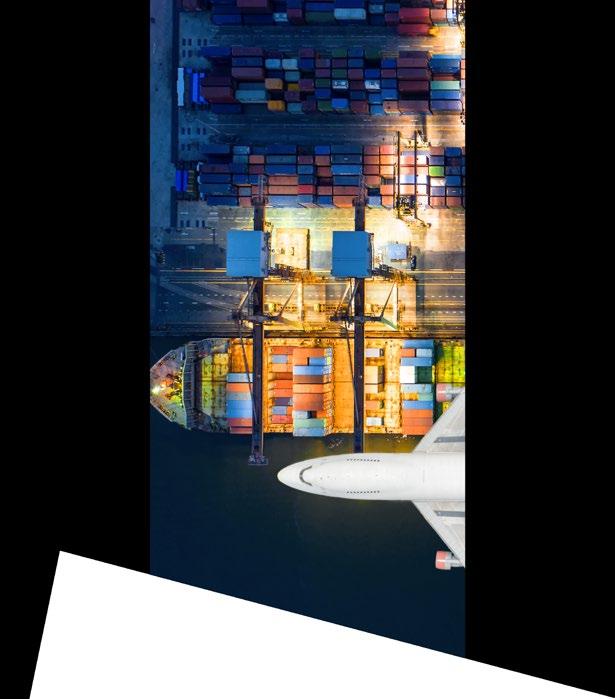



FIDI’s national and regional Associations are vital links between Affiliates and FIDI’s office in Brussels, digesting and sharing information with their membership, ensuring their voices are heard at the global level, and helping set high standards within the international moving industry. FIDI Focus Editor Dominic Weaver talks to FIDI Germany President Susie Freifrau von Verschuer and AMOE General Manager Ellen Troska about best practice for being an effective association

FIDI’s Regional Associations give Affiliates an essential two-way channel of communication with FIDI’s office in Brussels. A well-organised and engaged association provides a conduit for information that ensures the views of FIDI’s membership in different parts of the world are well represented globally within FIDI.
Germany has one of FIDI’s most active associations, with a hands-on approach and dedicated staff providing an ongoing service to Affiliates in the country.
The organisation is an arm of Germany’s Federal Association of Furniture Forwarding and Logistics (AMÖ), which has 800 members. Within it is AMÖ’s international division, membership association the Gruppe Internationaler Möbelspediteure (Group of International Movers, or GIM), with 42 members. FIDI Germany is a part of GIM; it has 31 members, of which 23 are FIDI Affiliates and eight are FIDI Branch Affiliates. Eleven international movers are GIM members but are not yet affiliated to FIDI.
FIDI Germany is fronted by General Manager Ellen Troska who, together with the organisation’s board, facilitates timely and efficient communications between its membership and FIDI. This includes organising dedicated regional meetings outside of the General Assembly at FIDI Conferences or other official FIDI gatherings.
FIDI Germany President Susie Freifrau von Verschuer, CEO of German Affiliate Fermont International, says: ‘Having attended the last FIDI Conference, we understand that a lot of associations only have their regional or organisation’s meetings during this event – which is just too late. In Germany, we used to meet just once or twice a year, but now the board meets at least once a year in person and has four or five meetings online. All FIDI Germany members have the opportunity, at a minimum of twice a year, to have a meeting online or in person.’ She adds that people enjoy the social side of national collaboration, so an informal dinner is often part of the in-person meetings.
Boosting communication in this way has significant advantages, including digested summaries of
Tips for becoming a standout FIDI Regional Association, from FIDI Germany
l Have one point of contact. Funded by a small fee, this makes communications and membership engagement so much stronger.
l Read the information. Ensure that your membership knows what FIDI is proposing, make it accessible to them, and make it easy to respond.
l Limit time for your meetings. We would recommend two hours as a maximum –and create a bitesized agenda with the main points you want to cover.
l Maximise engagement. Run online and in-person regional meetings. Encourage your membership to go to wider FIDI meetings as well as these.

Contact us:
Contact us: Hendrik Donner | hendrik.donner@henk-international.de Kosa Freihöfer | kosa.freihoefer@henk-international.de
kosa.freihoefer@henk-international.de hendrik.donner@henk-international.de


significant documents to ensure members are clear on the meaning before they are discussed, says Troska. ‘It means we can consider contributions from all our members in advance of the main FIDI meetings,’ she adds. ‘When significant changes are proposed, the organisation will summarise important points or documents to allow members to discuss and develop a clear position for FIDI Germany, with summaries of these preliminary discussions submitted to the FIDI office.’
Having a single point of contact for the association is a particularly powerful tool for associations, says Von Verschuer. ‘You just need to have one person in charge – and someone who is available when the main contact is on holiday or not around,’ she says. ‘It means you have someone neutral who can really understand key documentation or legislative changes.’
Troska is supported by a ‘strong board’ of FIDI Affiliates, which, crucially, includes members who have worked with FIDI for a long time and therefore understand its objectives well.
FIDI Germany also supplements central FIDI office
“A dedicated staff member means you have someone neutral who really understands key documentation or legislative changes”

communications with its own internal newsletter to keep its membership informed and engaged with matters of specific relevance to Affiliates in the country, such as local travel disruption or legislative changes that affect international operations. It plans to set up a separate landing page for FIDI Germany members, linking to the main AMÖ webpage.
As with most organisations, there are differing levels of engagement from the membership, but the association does all it can to ensure everyone is involved to some degree and attends meetings.
‘We will call them to get them on board,’ says Von Verschuer. ‘If they don’t react to our communications, we call them and say: “We have a meeting; you need to send someone; we need you to get involved”. FIDI is our organisation and, if you don’t get involved, then you can’t complain if you don’t get what you want.’
Time variations within FIDI’s larger regions can make it tricky to get everyone to attend online, and travel distances are greater for in-person meetings, but the benefits of meeting as a region outweigh the difficulties, says Von Verschuer.
‘There isn’t so much of a time difference within Europe, so it’s not difficult to set up a meeting in one time zone and get everyone involved. But, in the US, for example, you have four hours between east and west – and in Asia there are huge time differences, so you can understand the difficulties from this point of view,’ she says. ‘However, the regional meetings facilitated by FIDI are really helpful and it shouldn’t be a problem for someone to attend at least one of these.’ .

We would be grateful to advise you from our regional offices in Germany*, Spain*, Poland, Belgium, Slovakia, UAE and Cuba.
Moving worldwide since 1903

Hendrik Donner, Director International Move Management, Henk International
FIDI’s local or regional Associations play a central role, as they represent the specific interests and needs of their members locally. Liaising between the Affiliates and the global FIDI organisation, they promote the exchange of best practices and support compliance with FIDI standards. Additionally, they strengthen our membership’s network and help develop the industry within their regions.
It is important for our business to have a strong FIDI Association because it provides us with access to a global network of trusted partners. This allows us to guarantee our customers the highest quality standards and seamless operations worldwide. This, in turn, helps us remain competitive and deliver excellent service to our customers.
Henk International engages in the regional and international business of FIDI by actively collaborating with other members and contributing to industry initiatives. We leverage our membership to exchange insights, ensuring that we stay ahead of industry trends and maintain high standards in our operations. Our involvement in FIDI’s regional and global activities helps us build strong partnerships and integrate the latest innovations, enabling us to provide superior service to our clients around the world.
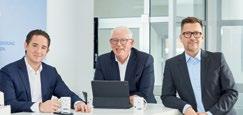

Erik
C-Johnsen,
Managing Director and CEO
While FIDI is a global organisation, its roots are in every country and region where there is a FIDI Affiliate. For FIDI to be successful, it is essential to get local input – of information, opinions, needs, expertise, and constructive criticism –from all the member regions. FIDI’s Regional Associations provide this in a really professional way, ensuring FIDI is an international organisation benefiting from the best local expertise.
With more than 30 leading moving companies as members, FIDI Germany already has strength in numbers. But it’s not about quantity – the quality of the businesses and representatives involved in FIDI Germany is the most important. They are incredibly committed to our regional association, which makes a huge impact. Having a strong, dedicated and visionary regional FIDI Association means our words, ideas and opinions are brought to FIDI in a professional way.

Nicolette Meyers, Hasenkamp Relocation

Markus Luthe, Managing Director
Having a strong FIDI association is important to us. It ensures that we operate within a network of trusted and reliable partners who adhere to the same high standards of service and professionalism that we do.
Hasenkamp actively participates in FIDI’s regional and international business activities. We regularly attend FIDI conferences and meetings, where we engage with other members, share knowledge, and collaborate on initiatives aimed at improving the industry.
We are also committed to continuous learning and professional development through our regular attendance at the FIDI Academy.
The company is currently represented on the board of FIDI Germany by our managing director, to represent the interests of our business and of German Affiliates as a whole.

In addition to the great FIDI conferences and the information provided via newsletters or FIDI Focus, Hertling takes part in the regular FIDI Germany meetings. These are very important for us, as we get briefed by our chairperson and other representatives of FIDI Germany about current topics and developments taking place in the “FIDI world”.
Our members discuss, ask questions, criticise (positively), make suggestions, and receive information – it’s a great opportunity to exchange information.
The FIDI Germany office is always easy to contact throughout the year, and is ready to help and inform our members. It’s a huge benefit for us, and I am very happy and thankful for this.

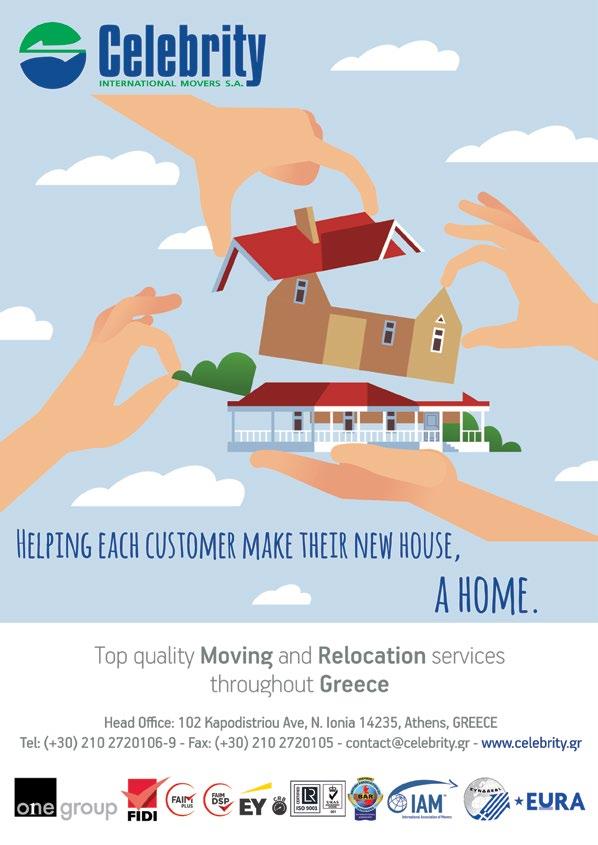

FIDI’s new carbon calculator tool has been rolled out as the result of a partnership with software platform provider Worldfavor. Emma Ghebaru, Account Executive at Worldfavor, details how this cooperation will drive increasing sustainability in the global mobility industry
Worldfavor is a leading global SaaS (software as a service) platform, where businesses can easily share their sustainability information and request data from their suppliers and other partner organisations.
This network effect makes it easy for companies to share the same information with clients, business partners, suppliers, internal stakeholders, and industry associations – making everybody’s life more efficient and driving a real, positive impact.
carbon calculations efficiently.
We have also created a comprehensive Knowledge Hub, designed to meet the unique needs of FIDI Affiliates and the relocation sector. This resource supports companies at any stage of their sustainability journey, providing essential tools and information to help them get started and maintain accurate records.
a range of resources designed to simplify and enhance sustainability data management for FIDI Affiliates, free of charge. These include:
“The standard platform covers the basic carbon measurement needs of any relocationsector company, and can be adapted to the specific needs of reporting scope, sustainability maturity, and strategic requirements”
Thanks to our special partnership with FIDI, we are enabling companies in the relocation industry to measure and share their sustainability information in a way that makes sense to all stakeholders involved. By simplifying carbon calculations and sustainability data management, we can accelerate positive change in the industry.
In close collaboration with FIDI, we have developed a carboncalculation solution that is tailored to the international moving and relocation industry, ensuring clarity and relevance, and enabling companies to understand carbon accounting without having to be experts in emission factors and the greenhouse gas protocol.
The goal is to make it as easy as possible for FIDI Affiliates to measure, report and share their carbon accounting data. Its user-friendly interface guides members on what data to provide and how to perform
The carbon calculator and Knowledge Hub represent our commitment to supporting FIDI and the relocation industry in achieving sustainability goals through standardised, accessible and efficient sustainability measurement practices.
Beyond the purpose of lightening the burden of carbon measurement for companies, this project is a big step towards streamlining the process and reporting of sustainability efforts within the whole industry.
Magali Horbert, Sustainability and Strategic Communications Manager at FIDI Global Alliance, says: ‘Without adopting a coordinated approach to measuring and reporting on our sustainability impact across the entire relocation industry, clients and decision-makers won’t be able to compare one supplier or one activity with another. This project aims to drive an industrywide, standardised approach to carbon measurement, ensuring comparability at an industry level.’
As part of our commitment to the sustainability efforts of the FIDI community, Worldfavor provides
l Worldfavor Transparency Account: Your company’s own Transparency Account gives you access to the carbon calculator and reporting tools. You will be able to store data and track your sustainability progress over time, share this data with your business partners within the network, and access a wide range of educational material on sustainability topics and best practices.
l FIDI x Worldfavor Carbon Calculator: This calculation tool covers the main activities of any company active in the international relocation business. It allows you to calculate the emissions linked to your company’s activities, helping you understand your company’s Scope 1, 2, and 3 emissions, and gain insights into your environmental impact.
l Knowledge Hub: Designed for companies active in the international moving and relocation sector, this online resource helps you to understand, in practical terms, what carbon accounting is, what data you need to collect, and how to use the FIDI x Worldfavor Calculator. Here you will find links to specially curated webinars, templates, and guidelines. The Knowledge Hub is a crucial part of the platform, as it provides clarity on what actions are being taken, why they are important, and their wider implications.
You can find more information

and relevant links to the Knowledge Hub and the platform on FIDINET.
While the standard FIDI and Worldfavor platform is designed to cover the basic carbonmeasurement needs of any company active in the relocation sector, it can be tailored to a company’s specific requirements in terms of reporting scope, sustainability maturity, and strategic requirements.
For companies with more complex reporting requirements
or that want to measure and track different sustainability metrics across offices or their supply chain, Worldfavor offers a special ‘sourcing solution’ as an addon – see the example of Arpin International Group, below. It allows companies to develop their own supplier engagement strategy using the Worldfavor network effect, and to gather their Scope 3 emissions data in an efficient way, helping to streamline operations and facilitate mandatory supply chain data reporting.
FIDI members who are

By Karen Bannon, Director of Marketing and ESG at Arpin Group, Inc.
At Arpin International Group, we have long been committed to sustainability, looking to improve our policies and processes continuously. Recently, we have taken steps to gather data from various stakeholders, including our supply chain. By collecting our Scope 3 data – representing the majority of our company’s greenhouse gas emissions – we aim to identify and mitigate risks within our own supplier network.
Adopting the Worldfavor platform has empowered us to make better-informed decisions, achieve operational efficiencies, and gain deeper insight into our supply chain, while bolstering Arpin’s long-term sustainability and resilience.
The comprehensive onboarding process and instructive Knowledge Hub helped our Global Sustainability Committee members to ramp-up quickly. Within a few weeks, we were gathering data on a global scale, in line with Arpin’s broader sustainability objectives.
interested in a bespoke Worldfavor Sourcing Solution benefit from a preferential rate.
l For more information on our partnership with FIDI and how the sourcing solution can benefit your company, please contact: Emma Ghebaru, Account Executive: emma@worldfavor. com, +4679 102 002 8 My Gummesson, Customer Success Manager: my.gummesson@worldfavor.com Magali Horbert, FIDI Global Alliance: magali.horbert@fidi.org
We have implemented the use of the FIDI x Worldfavor Carbon Calculator to streamline our carbon accounting. We have also expanded our scope to gather broader environmental, social and governance (ESG) data from our global offices, as well as our suppliers. This includes compliance-related information; we now collect data across our global offices on broader sustainability practices, focusing on environmental and social areas, including:
l Ethics, diversity, equity and inclusion, and leadership practices
l Code of Conduct, Anti-Trust, and Disaster Recovery policies
l Number and location of suppliers to access risk management
l Supplier operations and collaboration details
l Environmental and social practices of suppliers.
This comprehensive data collection provides a clear baseline, enabling us to set realistic targets for carbon accounting and ESG initiatives.
By proactively identifying and addressing risks within our supply chain, we are building a more resilient global supplier network for the entire Arpin Group. This approach not only supports our group’s sustainability goals, but also enhances our overall business viability, providing stakeholders and clients with reassurance about Arpin’s commitment to sustainable growth.
Through these efforts, Arpin International Group continues to lead in sustainability, setting an example for the industry and ensuring long-term success.

Rossella Scalone set up Rome-based Magnolia Moving 12 years ago, with a focus on the luxury, hypercare end of the market. FIDI Focus Editor Dominic Weaver spoke to her about what it takes to be successful in the sector – and why she still suffers from imposter syndrome
Like so many in the moving industry, Rossella Scalone joined the business by chance, fell in love with it, and stayed for good.
The founder and CEO of Rome-based Magnolia Moving says: ‘If you had told me I was going to become a mover, I would have laughed. When I was younger, I wanted to become a vet, then a PE teacher, then a diplomat, or to work for a not-for-profit organisation.’
With both parents having worked in a hospital in southern Italy, there was no family precedent for the moving industry, either.
When she was 19, Scalone moved north, to Rome, to study oriental languages, including Hindi, Sanskrit and Tibetan, none of which were apparently of any direct use to her in choosing a career. However, they ‘helped me experience the diversity of languages and cultures; to understand different mindsets and the diversity of ideas’ – which, she says, isn’t a bad skill set to have when you work in moving.
A few years later, when she was looking for a job that, above all else, was located close to her son’s nursery, Scalone applied for an accountancy role at Bolliger. However, company founder Robert Bolliger understood quickly that her people skills suited her to a different role entirely. ‘I was hired instead as European traffic manager and learned the ropes of the trade at the great school of Bolliger,’ says Scalone, who is still thankful for her encounter with the company head.
‘Robert Bolliger was one of the most powerful and charismatic personalities I have met in my life, and he was a gentleman, too. I feel blessed to have met him as my first industry mentor.’
After eight years in the role, Scalone had developed an ambition to work much more closely with clients, and had a vision for a business that would give her freedom to work hard while living life and caring for her young boy in the way she wanted to. It was the basis for Magnolia Moving, which she established in Rome in 2012.
‘Back then, working and workplace flexibility was utopic,’ she says, ‘so I set up a company that would give me the right work/life balance and the ability to manage my time more flexibly.’

The hard work of owning and running a company started immediately. ‘In my first six months as owner of Magnolia I didn’t take a salary, because there wasn’t enough business. I studied, took out licences, memberships, maintained contact with partners and suppliers, created a new network of collaborations, rented facilities, and bought equipment,’ she says. ‘It wasn’t easy to do all of this in six months – and raise a child at the same time.’
One of Magnolia’s first corporate clients came as the result of a friendship Scalone had developed with a woman who had moved privately through Bolliger. ‘When she moved, she was having a difficult time, going through a divorce, and needed a lot of looking after,’ she says. ‘It turned out she worked for a major fashion brand, and we started working for them in 2013, not long after I set up Magnolia. She has left the company now, but she is still one of my best friends.’
This job was followed by others for the designer brand, laying the foundations for the company’s specialisation in the ‘hypercare’, luxury end of the market, providing whiteglove moving and relocation services for clients who, today, also include fashion shows and VIP events.
This year, the company celebrated its 12th anniversary by handling a large design-office relocation from Rome to Milan for an Italian luxury firm, moving around 800 cubic metres over eight weeks. ‘This involved meticulous, whiteglove services – with no claims,’ says Scalone.
‘We also handled home searches, check-ins and check-outs, and utility transfers for every transferee, and gave regular reports and updates. We had high customer satisfaction and positive feedback from the HR departments.’
Scalone sums up the reasons for Magnolia’s success in this sector in three words: coordination, simplification, and synergy. ‘The presence of at least two team members at both the origin and destination allows us to address any issues promptly, effectively becoming an extension of our clients’ offices,’ she says.
Magnolia Moving CEO Rossella Scalone says she chose the company name for a good reason:
‘A magnolia is a strong plant that adapts to habitats all over the world. The name is also the same everywhere you go – so, regardless of where you are, everyone understands what a magnolia is.
‘Magnolias were planted in front of colonial houses in the US in the 18th century to bring good luck. So what better name for a company that is moving people to a new house to start a new life?’
“Being a woman with a new company in a world of maledominated giant moving companies came with challenges”
However, a traditional “feminine touch” helps the company stand out in this exacting sector: it has a majority female staff in its Rome offices. ‘Being a woman with a new company in a world of male-dominated giant moving companies came with its own set of challenges, so I focused on my strong points to diversify the business with a boutique offering,’ she says.
In contrast to artificial intelligence, Scalone favours ‘artisanal intelligence’: personalised, high-care service and attention to detail. ‘This way, we can really provide flexibility, creative problem-solving, and emotional support,’ she says. ‘It means we can be culturally and aesthetically sensitive, have human oversight over quality, and preserve traditional craftsmanship.’
While the company innovates with technological initiatives for a greener fleet, warehouse energy efficiency and more eco-friendly packaging, Scalone insists ‘our customer care will always stay human’.
This approach means the company can provide the bespoke services demanded by luxury clients that larger moving firms find more difficult to do. ‘We care more about lives and real people with personal stories than files and numbers,’ says Scalone. ‘We focus on exceptional empathy and 24/7 availability to cater for the busy schedules of these customers.’
It’s an approach that underpins the level of customer trust that is so vital in this sector, she adds. ‘Even if it’s the first time I’ve spoken to a customer, I establish a connection, so they feel safe entrusting their belongings to us. The first thing I say is that I will be honoured to handle their removal – and that I will be their point of contact from beginning to end.’


Such intensive attention to customers requires the ability to switch off quickly – Scalone says yoga and meditation are a must. It also requires experienced support, which Scalone has in Chief Operating Office Iulia Vrabie, Relocation Manager Consuelo Galli, Junior Operations Coordinator Annaclaudia Gentile, and International Import Manager Eva Giglio.
To add to countless customer plaudits and recommendations, four years ago Magnolia was awarded the Minerva prize for Excellence in Female Leadership, an award presented by the Italian government to recognise outstanding contributions by individuals or organisations that have significantly advanced knowledge and innovation in the fields of culture, science and education.
The company also deals with more cost-sensitive ‘standard service’ clients – agents and private customers – to give it a portfolio beyond luxury hypercare.
‘Generally speaking, I think planning is the most important all-round skill in moving,’ says Scalone. ‘You should start with a sound business plan, but there will be unexpected situations in which you have to adapt, because, as we know, moving is not an exact science.
I always have a plan B; and a plan C.’
To be a great mover in whatever sector of the market you are in, she adds that ‘you need true confidence, ambition, self-motivation, and great communication skills. You need to be flexible, and always able to take something positive away from adversities.
‘Life has its own plans and what we perceive as
“Life might not end up how you imagined it, but that is OK –expect the unexpected and do what you do with passion”
failures in the beginning are actually opportunities. Life might not end up how you imagined it, but that is OK –expect the unexpected and do what you do with passion.’
Scalone still enjoys the variety of different situations, customers, partners and suppliers that her boutique moving agency presents her with. ‘One moment we are asked to speak with the Sultan of Brunei and the next we’re dealing with a driver,’ she says. ‘I feel comfortable in every situation – chameleonic and empathetic.’
As her business has thrived, Scalone has had to tackle the imposter syndrome she has felt at the most successful moments of her life. ‘I usually see myself more fortunate than deserving,’ she says. ‘Even when I was a young gymnast, after winning a competition I just felt lucky, and totally forgot the daily training, including weekends, all the effort, commitment and sweat.’
But she is getting there. ‘I am trying to convince myself,’ she says. ‘I recently read a great quote by the American producer Shonda Rhimes: “I am not lucky. I am smart, talented, and take advantage of the opportunities that come my way, and I work really, really hard. Don’t call me lucky, call me a badass!”’
As a newcomer to the Swiss moving market in 2020, Atlas Switzerland – a branch of Netherlandsheadquartered Atlas International Movers – has been focused on delivering quality services to its demanding clients. With the company recently joining FIDI, Managing Director Peter Visser tells FIDI Focus about establishing the company as one of the country’s premier movers

With some of the larger traditional players losing market share either because of a changed vision or the closing of offices, it was only a matter of time before companies such as Atlas took the opportunity to service global clients, RMCs and corporates directly in Switzerland.
Expanding into Switzerland has given Atlas International Movers a second leg to stand on outside of the European Union in an ever evolving, high-quality market. Atlas Switzerland has its own operations, bonded warehousing and European trucks crossing Western Europe and the UK every week. Switzerland is the first step in our expansion in Europe.
There is a high level of professionalism in the Swiss moving market. The country’s high standard of living, and the presence of many multinational companies and international organisations, drives a market in which quality and precision are highly valued. This is the reason Atlas Switzerland has its own local crew and move managers based in the country. All have been in the business for many years, know the local market well, and have an excellent Swiss quality service standard.
The country’s mountainous terrain, alongside the urban density of cities such as Zurich, Bern, Geneva and Basel, make logistics challenging. Movers must navigate narrow streets, limited parking and strict building regulations.
Over the past decade, there has been an increase in international relocations to Switzerland, as a result of expatriate growth and an influx of multinational corporations.
The most popular domestic destinations for our inbound clients are still larger cities, including Zurich,
Our Swiss branch and company headquarters in the Netherlands have worked hard to reduce our carbon footprint and minimise and manage the environmental impact of our operations and offerings.
We only use 100 per cent recycled packing materials and crates, for example, while pallets and lift vans are all reused.
Our Dutch warehousing facility has a solar-panelled roof and our planning department optimises our deliveries. We collect combined shipments across Europe or co-load with other parties to reduce emissions.

Geneva and Basel, with Zug, Luzern and Lausanne not lagging far behind. Outbound customers have a global span, but the Middle East has grown significantly as a destination recently, with the United Arab Emirates notably growing in market share. The corporate profile of the US means it will always be the major outbound and inbound destination for Switzerland overseas.
Technological advancements have helped movers improve tracking, inventory management and customer service. However, with Switzerland being a relatively conservative market, and despite the growth of virtual surveys, we still find that many of our Swiss-based clients prefer an in-person survey, which we offer all over Switzerland with our own team of consultants. We focus on the total experience of our customers; for many, it is the personal touch that makes the difference.
Companies in Switzerland have had to adapt to stricter regulations on the environment and labour, impacting on operational practices and costs, which has encouraged leaner and smarter ways of working for the industry. However, as a newcomer to the market in 2020, Atlas International Movers has always operated in this way.
Many clients are looking for a comprehensive offer, including full export packing, storage, customs clearance and handyman services, to ensure they have a seamless moving experience from door to door. At Atlas International Movers, we provide this highest service level from start to finish.
Switzerland reflects the global market that has been created in the past two to three decades. Of course, current geopolitical tensions may impact this. Although Switzerland is, and will be, a safe haven with growth opportunities for years to come, we may see challenges, with elections in many countries indicating a push for local rather than global policies.

Behind the scenes at each FIDI Conference is a group of experienced and dedicated suppliers who work with the FIDI office to ensure that every element of the event is a success. We speak with Petta Naylor, Director of S2F Events, and Michael Vermaak, Director of audiovisual production company Missing Link, about how they help make a good conference a truly exceptional one


If you have been to a FIDI Conference, have you ever stopped to wonder why it runs so smoothly?
The FIDI office, of course, plays its part, working with Affiliates on the location, content and other key aspects of the annual flagship event. Much of the heavy lifting, however, is done by a team of experienced partners, who ensure that, from the moment you pick up your delegate’s badge at the registration desk, every detail – from what sessions are running, and when, to the timing and venues of the social and networking activities – has been planned, discussed, and rehearsed, to ensure minimal margin for error.
Conference organiser S2F Event Management is one of the longest-standing suppliers to the FIDI Conference, with a team including Directors Petta Naylor and James Green, and Event Manager Suzie ProtheroeEvans. ‘I have been involved with the FIDI Conference since 2011, in Lisbon, when I started to help out with logistics on site,’ says Naylor. ‘Osaka, in 2020, should have been the first conference where I was responsible for all the registration logistics, as well as the social aspects of the programme, but COVID meant my first outing as events planner for the FIDI Conference was in Cannes 2022.’
Once a local or regional Association has invited FIDI to host the conference in their country or region, S2F will work closely with the FIDI office and the local or regional Association to ensure there is a suitable venue in which to stage the event. It will also check that the country meets a number of other criteria, including safety, ease of transport links, and costs, and that it has landmarks and attractions near the venue for social events and cultural tours. Global volatility is
among the factors that have shortened the planning time since COVID, but the ideal is three to four years in advance, says Naylor, who adds that one of the most common challenges is finding a venue that does the conference justice.
‘Dedicated conference venues might have plenty of room for the FIDI Conference, but they tend to be soulless places with no character or interest,’ she says. ‘Whenever we can, we try to place the conference in a hotel. This allows people to meet and network at the bar, over breakfast, in the gym, or in the pool, as well as during the conference. We know that the informal networking is as important to Affiliates as the programmed networking.’
The venue must be easy to get to and a commutable distance for events including the welcome reception, Tour4All, gala dinner and the local FIDI Association evening.
‘We try to find a hotel that can accommodate the conference and has enough rooms for as many Affiliates as want to attend,’ Naylor says. ‘This can be a tall order, however, if you are working with UNESCO sites alongside ever-increasing attendance figures.’
Forward thinking, and providing information to delegates in advance, is important, but so is having the flexibility to deal with difficulties as they arise, Naylor adds.
‘In Bangkok, we had so many tuk-tuks for the FIDI 39 Club Itsy Bitsy Tour that we had to direct traffic outside the hotel to keep the taxis and private cars at bay while more than 100 tuk-tuks picked up our guests. Also in Bangkok, we set off in two coaches for the FIDI 39 Club informal dinner, but hit such bad traffic that we had to divert our guests off the coaches and onto ferries, to get them to the jetty in time for the dinner.’

Other issues that S2F has had to negotiate have included a national strike in Greece on the final day of the conference, which meant no-one could leave the country (‘this also meant no-one could get into the country, so we could organise additional nights at the hotel’, says Naylor), and developing a bespoke COVID policy for the Cannes conference for the safety of all involved.
For the most part, a typical day at the conference for Naylor is spent in the FIDI office on site, checking on the day’s activities and that the hotel and local partners are ready. She also ensures that volunteers are briefed, the audiovisual crew know of any programme changes, attendance lists are finalised for the day’s tours, and the FIDI Board members know where they need to be and when.
‘My day is taken up ensuring that everything we have planned and worked for is delivered on time and as we have specified,’ she says, adding that, once the FIDI 39 Club Conference and activities start on the Saturday, she will work at least 16 hours a day until the closing gala dinner on Wednesday.
Seeing everything come together is well worth the hard work, though, says Naylor: ‘From the excitement of the roll-call entertainment and the anticipation of where the Welcome Reception or Tour4All is taking place, to seeing people catch up with old friends and enjoy the activities we have put on is the best bit.’
While the conference requirements haven’t changed much, Naylor says the process has. ‘Being a supplier to FIDI means that I liaise directly with Jesse van Sas, FIDI’s Secretary General, and this has streamlined our communications and made the planning process far easier,’ she explains. ‘It was a steep learning curve, as FIDI is very particular about what it wants and how it wants things presented,
‘It wasn’t funny at the time, but it is now’

Our suppliers on some of their favourite conference moments
S2F’s Petta Naylor:
‘We had to catch a ferry to Sainte-Marguerite island for the Cannes Tour4All. The first ferry had docked and unloaded its passengers, and we were on the second ferry coming into dock. Our captain was an elderly gentleman, who struggled with the choppy water. People, including me, were getting quite nervous as the boat was being thrown about by the waves. Then the rope snapped and we had four or five attempts before we docked successfully. It wasn’t funny at the time, but it is now.’
At Gosford House, in Edinburgh, the funniest thing I have ever seen was Magali Horbert, FIDI’s Sustainability and Strategic Communications Manager, trying to throw a hay bale over a bar with a pitchfork. Both the pitchfork and the bale were bigger than she was, but she gave it a good try.’
Missing Link’s Michael Vermaak:
‘Trying to explain FIDI’s unique roll call to local AV [audiovisual] suppliers and the hotel conference team on a site visit is funny. The shock on their faces, followed by the phrase ‘What, everyone?’ always makes me laugh.
‘Talking of roll call, our cameraman, Brian, always gets on stage ready to beam delegates onto the screens. In Amsterdam, he got into position and moved an easel off the stage to position his camera – but it was supposed to be used by Freddy Paxton. Over our comms we shouted to Brian “quick, get the easel back on stage”, but the easel decided to dismantle itself in the process. Cue us talking him through how to build it while on stage in front of the audience, Freddy continuing his presentation off to the side. I wish we had that moment recorded.’

Missing Link’s Michael Vermaak:
SF2’s Petta Naylor:
‘It’s difficult to choose my favourite. Cannes was challenging because it was my first FIDI Conference as the event planner. Bangkok was a new country for me and I was blown away by its beauty, and then Edinburgh was almost home turf, so I wanted to show off the best that the city had to offer. Let’s just say that my favourite conference is still to come!’
‘Geneva was the first FIDI Conference where I switched from being a technician to a production manager, so my role changed dramatically, with the planning beginning at least nine months before the conference. This event also culminated in one of the best after-parties we have ever put on.
‘Cannes is another favourite. Most people won’t know how challenging the conference was and the numerous issues we faced with the hotel. But it was also an emotional conference, because it was the first since the pandemic. Seeing people get together again was amazing and all the issues we faced were blown away by seeing that. I don’t think I’d ever heard so many conversations about people’s families before then. It really was great to experience.’
but with Cannes, Bangkok and Edinburgh under my belt, I am looking forward to Dubrovnik.’
Audiovisual (AV) production company Missing Link –which specialises in conferences and awards shows – is another stalwart of the FIDI Conference, having worked on the event since 1996.
Director Michael Vermaak, who is Production Manager throughout the conference, says: ‘My role is to oversee the technical production of the event; ultimately, it’s to make sure everybody has a wonderful and safe experience.’
On a typical conference day, Vermaak and his team eat breakfast at 7am, with a briefing of what is to come during the day and rehearsals scheduled in if needed. ‘Some crew will manage the AV for the meeting rooms while others will be filming for the daily postcards,’ Vermaak says. ‘Nathan, from HVP Studios, will be uploading the “Postcard from FIDI” video from the previous day and starting the edit of that day’s content, along with the main edit for the finale video. The day culminates in us preparing content for the following day and more filming of evening activities.’
Audiovisual challenges include moving heavy and valuable equipment long distances and over international borders, and negotiating cultural differences when working in different countries. Content changes are commonplace, too. ‘When making changes to PowerPoints or videos, the key rule is never to assume,’ says Vermaak. ‘Clear instruction and communication are key to making sure everything is correct when a presenter goes up on stage.’
The biggest test, however, is meeting the nonnegotiable demands of a live event. ‘We have to be ready on time; we will never ask a client to delay,’ he says.
Problem-solving is a huge part of any live event, adds Vermaak, and the joy of working on a conference such as FIDI’s is the work that goes into matching the specifics of each venue to a client’s requirements.
He says: ‘We’ve flown equipment from Nairobi to the Maasai Mara for a conference; built custom ramps to allow a client to drive a motorbike onto the stage; organised a rooftop fireworks display at a university; built a stage set overnight with tools and parts from Home Depot in America because our container didn’t turn up; and driven 24 hours non-stop through Europe to get the crew on site for a conference after mass plane cancellations.
‘Good planning is always a great way to mitigate any last-minute challenges and, for the FIDI Conference, my crew, S2F and the FIDI office work hard to ensure disruption doesn’t happen.’
For Vermaak, the most rewarding part about running a conference is clear: ‘It’s seeing people with smiles on their faces, seeing people we’ve known for years and meeting the new delegates. The reaction from the audience when the bagpipers came into the ballroom in Edinburgh was fantastic, for example. Each conference has something special.’
The future of the FIDI Conference FIDI’s Conference suppliers give their thoughts on what we might expect from the event in the future
‘If I look at conferences we organise for other clients, I think FIDI could move away from the big keynote sessions and offer smaller, interactive workshops on specific subjects that affect the membership,’ says S2F’s Naylor. ‘There will be room for the big, all-embracing keynotes, but the more instructional sessions could prove as popular.
‘One thing I don’t think will change is faceto-face networking, which continues to be a big part of maintaining and making new business connections. Video meetings have been a fantastic development over the past five to 10 years, but nothing beats meeting in person.’
Missing Link’s Vermaak agrees: ‘I think COVID taught us that nothing beats meeting face to face. As a result, I feel we need to focus on networking and social opportunities. The Tour4All is a great example of this - it helps newcomers break the ice with other delegates.
‘The business sessions are still a key part of any event like the FIDI Conference. Some of our clients are now running sessions that include lots of audience participation or roundtable discussions, which delegates have found very useful.’
Naylor adds: ‘I am certain that conferences, especially ones such as FIDI’s – with its mix of formal and informal meeting opportunities –will continue to be the place to meet and do business for years to come.’
After 10 years serving clients moving within the US and internationally, New York-based Earthrelo Inc has become a FIDI Affiliate. FIDI Focus talks to its President, Samir Shah, about the business, future plans, and why FIDI membership is a natural next step for the company

FIDI Focus (FF): Please tell us about your local market Samir Shah (SS): Earthrelo is based in New Jersey, with its corporate headquarters minutes from the major seaport and airports of New York, working alongside a FIDI-affiliated Branch in Los Angeles.
Our strategic presence in two of the busiest cities of the US gives us a competitive advantage and direct access to major business hubs, including New York, Boston, Washington, DC, Los Angeles and the San Francisco Bay area. Our locations have played a significant role in the company’s growth over the past decade.
FF: What are the most popular destinations for transferees from the US?
SS: The most popular domestic destinations include:
l New York City: As a global hub for finance, media and culture, New York City attracts transferees taking up career opportunities and looking to enjoy the vibrant lifestyle.
l San Francisco Bay area: Well known for its tech industry and innovation, the Bay area attracts transferees involved in technology and start-ups.
l Los Angeles: With its thriving entertainment industry, Los Angeles attracts transferees from the media, entertainment and creative fields.
l Washington, DC: As the country’s capital, DC attracts transferees working in government, policy and international organisations. Internationally, popular destinations for transferees from the US include:
1. London, UK: London is a significant financial hub, with diverse industries, so we are serving transferees in finance, consulting, and various professional services.
2. Tokyo, Japan: A major global city with opportunities in technology, automotive and finance, Tokyo is attractive for transferees seeking international experience.
3. Shanghai, China: Known for its rapid economic growth and opportunities in manufacturing, technology and finance, Shanghai is a hub for business in Asia.
4. Sydney, Australia: With a high quality of life and opportunities in finance, healthcare and technology,


blend of career growth and lifestyle.
FF: Can you tell us how your market has evolved and how Earthrelo has adapted?
SS: Our industry has seen several recent developments driven by technological advancements, sustainability initiatives, regulatory changes, and shifts in consumer expectations. We believe that it is very important to invest in the latest technology, such as mobile apps for surveys, online platforms for management of quotes and bookings, and real-time tracking of shipments. We use customised customer relationship management software called QuellMove.
We also invest in sustainability initiatives, using ecofriendly packing materials, optimising transportation routes, and offering carbon-offset options for customers. We also encourage our office staff to work remotely regularly, to promote their work/life balance and reduce vehicle use for commuting.
FF: Why did Earthrelo decide to join FIDI – and how did you find the FAIM process?
SS: As Earthrelo completed 10 successful years in the international moving industry, we felt the need to put a sustainable growth plan in place. I decided to join FIDI to enhance our international moving services and credibility. I felt that membership would help us adhere to strict quality standards and ethical business practices, which is crucial for customers who entrust their belongings to us for international relocation.
We found the FAIM certification process rigorous, but beneficial. It involved thorough audits of our operational procedures, financial stability checks, and customer satisfaction levels. It increased our confidence in our team as well as our internal processes.
FF: What are your plans from here?
SS: In the next five years it is to grow our corporate and RMC business, and become one of the most reliable partners for our agents around the world.
PowerPoint has long been the presentation tool of choice, but surprisingly few people manage to create truly engaging decks.
FIDI Communications Manager
Magali Horbert gives us some tips for avoiding dreary presentations


Over the past few months, I’ve endured my fair share of mind-numbing presentations. I’ve seen the dreaded “death by PowerPoint” up close and personal, and, trust me, it’s scarier than a spreadsheet on a Friday afternoon.
In the realm of business presentations, PowerPoint reigns supreme. Yet, too often, these slide shows turn into tedious, text-heavy marathons that leave audiences, yearning for the sweet release of the coffee break.
Why does this happen?
It turns out it’s not just poor design – it’s neurological. Our brains are marvellous machines, but they have limitations (some more than others), especially when bombarded with too much information. Research shows that the brain can only process a limited amount of text and visual stimuli at once. When overwhelmed, it taps out, leading to disengagement and poor retention of information.
And here’s the kicker: too often, we don’t give enough thought to the real purpose of a PowerPoint presentation. Whether it’s to convince the audience of an idea,
explain a complex concept, or share vital information, the PowerPoint is merely a visual aid for the audience. The star of the show is you, the presenter; your slides should not overshadow or overcrowd you.
Our brains are wired to process visuals quickly and efficiently. We are naturally drawn to images and high-contrast elements, and we prefer simplicity over complexity. Understanding these preferences can help us design presentations that keep the audience’s attention and make the information stick.
So, how do you avoid sending your audience into a PowerPointinduced coma? Here are 10 brain-friendly design tips to keep your presentations engaging and effective.
1. Just KISS: Keep It Simple, Silly Stick to one idea per slide to avoid overwhelming your audience.
2. Bullet points, short and sweet Keep bullet points concise to help the brain grasp and retain information – and one golden rule: don’t write full sentences. Remember, when faced with written sentences and someone speaking, the brain will switch to reading the text instead of listening. Keep it brief to keep them listening.
3. Six is your magic number
Use no more than six words per bullet point and six bullet points per slide. When a slide contains more than six points, the brain has to work harder to process the information, leading to increased cognitive load and decreased retention. Keep it simple to keep your audience focused.
4. Size does matter: check your font
Headings should be at least 30-point and body text no smaller than 20-point, so that even the person at the back can read without straining their eyes.
5. Sans-serif for the win
Choose readable fonts, such as Arial or Calibri, to reduce cognitive load – and never use more than two different fonts on one slide.
6. Contrast is crucial
Ensure high contrast between the text and background to enhance readability.
7. Visual elements are your secret weapon
Use high-quality images, videos and charts to support your message, but ensure each one has a clear purpose. Apply the same principle as with text: less is more!

8. Embrace the white space
Avoid overcrowding slides and use empty space to make key points stand out.
9. The power of darkness
Light font on dark backgrounds helps to keep focus on you, the presenter, and reduces eye strain, especially for large audiences and long presentations.
10. Animated, not agitated: use with caution
As fun as they may look, animations can quickly be distracting. Use them sparingly and always with a purpose.
By designing your PowerPoint slides to work with the brain’s natural preferences, you can transform your presentations from dreary to dynamic. So, the next time you open PowerPoint, follow these tips and banish “death by PowerPoint” for good.
Watch as your audience stays engaged – without needing that extra cup of coffee.
“The star of the show is you, the presenter, not the slides”


Swiss mover MW Relocation has made FIDI principles the cornerstone of its operations since it began trading seven years ago. This has underpinned steady development of its business and paved the way for FIDI affiliation – which it achieved earlier this year. FIDI Focus talks to CEO and founder Mark Muss about the journey so far and what comes next for the company


MW Relo was founded in 2017 by Mark Muss, an entrepreneur with almost three decades of experience in the international moving, relocation and global mobility industry. During this time, he has overseen operations in 14 countries and more than 60,000 relocations.
The company covers all areas of Switzerland from its offices in Geneva (FAIM certified) and Zurich (not affiliated to FIDI), servicing its clients in English, German, French, Italian, and other languages when requested.
‘Unlike many other countries, the main focus of the international moving market in Switzerland isn’t its capital city [Bern], but rather the larger cities of Geneva and Lausanne on the Romandie – the French-speaking side of the country – and Basel, Zug and Zurich on the German-speaking side,’ says Muss.
‘There are a larger proportion of corporate, diplomatic, and high-net-worth individual moves compared with most other developed countries.’
Other trends, however, match those seen in other markets, he adds, with moves generally becoming

smaller, and lump-sum packages on the rise. ‘Corporate transferees have more choice in the spending of their relocation budget,’ he says.
With Switzerland being an economic hub, Muss says its international links make other financial centres –such as Singapore, London and New York – natural destinations for the transferees the company is servicing, with warmer destinations, such as Spain and Florida, popular with the company’s retiree customers.
There are opportunities for those who want to expand in the market, he adds, particularly those with ‘final-mile capability’. ‘In recent years, many industry colleagues have reduced their resources and are now looking for local solutions. We are also seeing cooperation between colleagues increasing, with companies sharing resources – such as warehousing –where it makes sense to do so.’
Sustainability, too, is set to make a larger impact on the Swiss moving industry, and has already begun to shape the way the company delivers its services, says Muss.
‘Sustainability is certainly becoming front and centre for us in Switzerland,’ he says, ‘During the course of 2024, for example, we have set a target to be plasticfree, so no plastics would be used during a move –including tape.’
Gaining FIDI affiliation is a central part of the company’s growth strategy and it has worked hard over several years to ensure that its operations conform to the stringent standard required.
‘Since our inception in 2017, it has always been our goal to become a FIDI Affiliate,’ says Muss. ‘From the beginning, we have been working to FAIM principles –which we believe is the main reason we achieved “Top Performer Status”, with Zero NCV [non conformities] on the day of the audit.
‘Now we have achieved our goal, we are looking forward to participating with our FIDI colleagues in Switzerland and around the globe to promote quality and sustainable moving.’
Muss cites two core strengths in the MW business –its staff and assets – that will underpin its growth now that the company has become a FIDI Affiliate.
‘Our people are definitely key. We hire selectively, and our core team has worked together for two decades,’ he says. ‘Second, we have invested in physical resources, such as vehicles and warehousing, to deliver substantial services using our own people.’

After 20 years building up expertise and experience in the Canadian market, Orbit International Moving (Canada) – Toronto has launched the next stage of its strategic plan, becoming a FIDI Affiliate. Company President and CEO Adi Shaked tells FIDI Focus where the company plans to go from here

Orbit International Moving (Canada) - Toronto is really excited about joining the FIDI family (as a Top Performer), which marks a significant milestone in our commitment to providing superior international moving services. Leveraging more than 20 years of experience, we’ve established ourselves as a trusted partner for those seeking smooth and dependable relocations.
Canada’s dynamic immigration policy aims to attract professionals, entrepreneurs, and investors. The Express Entry system and Provincial Nominee Programs (PNPs) have also created demand by catering for regional labour demands.
Canada also supports humanitarian causes by accepting a steady influx of refugees and asylum seekers. Language training and job support are provided to help immigrants assimilate and boost Canada’s economy.
In the past 10 years, Canada has significantly increased its immigration targets, aiming for more than 400,000 newcomers every year. The number of PNPs has grown, offering more regional opportunities, and policies have shifted to prioritise economic immigration. Family reunification processes have been streamlined, while Canada’s dedication to resettling refugees remains strong.

Domestically, Toronto is the top choice because of its status as the country’s financial hub. Vancouver attracts people for its natural beauty and tech industries, Calgary for its energy sector, and Montreal for its cultural vibrancy and opportunities in the aerospace sector.
Internationally, many Canadians move to the US –especially New York and California – London in the UK, Hong Kong, Singapore, and Sydney, Australia, driven by economic opportunities and cultural affinities.
Locally, Canada’s technology, healthcare and sustainable energy sectors are expanding rapidly. Internationally, emerging markets in Asia, Latin America and Africa, as well as the global digital transformation and renewable energy focus, present significant opportunities for us.
The rise of remote work has changed relocation dynamics, offering more flexibility to the workforce. Sustainability has become a priority, with eco-friendly relocation options. Enhanced technology integration and a stronger emphasis on diversity, equity and inclusion in global mobility programmes are also shaping change in the industry.
Orbit Canada chose to become a member of FIDI because of our dedication to maintaining the highest standards. Thanks to the hard work of all our staff, we completed the application process in less than half a year and achieved a perfect audit score, earning us FIDI’s ‘Top Performer’ status. Being part of FIDI enhances the quality and reliability of our services and positions us alongside the industry’s elite moving companies.
Orbit is focused on sustainability, exploring ways to make our operations greener, including the potential for using electric trucks. Our commitment to innovation and excellence remains steadfast as we continue to improve our processes and services. We are investing in automation to streamline our processes, enhancing efficiency and improving the overall experience. Our move partners and clients will benefit from these innovations, allowing us to deliver even better service.
Orbit is proud to have become a part of the FIDI community. Our dedication to exceptional service, strong communication and innovative solutions makes us a valuable partner in the international moving industry – and we look forward to collaborating with fellow FIDI members and setting new benchmarks for quality and service.

After 30 years as Chairman, Andreas Amiet-Keller retired from the Keller Swiss Group’s Board of Directors at the company’s annual general assembly. His sons, Lorenz and Tobias Amiet, will succeed him as representatives of the fifth generation of the family business, which celebrates its 170th anniversary next year.
Tobias will chair the Board of Directors of Keller Schweiz Holding Ltd, while Lorenz will lead operating companies Keller Swiss Group Ltd, Margarethen Bus Ltd and Auto Margarethen Ltd, which are wholly owned subsidiaries of Keller Schweiz Holding Ltd.
The moving and relocation provider also announced that it is integrating the activities of Keller Relocation Ltd into its parent company.

Moving and supply chain technology firm Shipeezi has appointed Colin Ricardo as Chief Commercial Officer and Head of Product.
As Board Member and Non-Executive Director of the company, Ricardo has already helped the business develop its strategic roadmap for scalable growth.
Carlos Ferri, CEO of Shipeezi, said: ‘Colin’s expertise and leadership will be invaluable as we continue to strengthen our market position and enhance our product offerings. We are confident that he will play a key role in our growth journey.’
Graebel Companies, Inc has promoted Graebel President Ron Dunlap to the post of Chief Executive Officer. According to the firm, the move had been planned ‘for years’, as part of its strategic succession planning and ‘commitment to ensuring business continuity’.
Current CEO and Chair Bill Graebel, who recently celebrated 40 years at the company, will now lead the board full time.
The company said in a statement: ‘Bill will be focused on board recruitment and governance so that Graebel’s directors can continue to provide the insights, support and professional guidance needed to meet the accelerating pace of change in global mobility.’

ISS Dubai has promoted a member of its Dubai sales team, Anish D’Souza, to Country Manager for Saudi Arabia (not affiliated to FIDI). The company said in a statement: ‘Anish’s exceptional contributions and dedication have made him a standout leader, earning the respect and admiration of our team, private and corporate customers, and partners. In his new role, Anish will assume leadership of our operations in Saudi Arabia, one of the most dynamic hubs for relocation business in the Middle East. He will manage the spearheading of strategic initiatives, driving growth and keeping our reputation for excellence in service delivery.’


OMNI (Overseas Moving Network International) has appointed two new board members –Eric Tate, from Aires in the US, and Ido Barner, from AGS Mobilitas group.



JK Moving has appointed Mike Coleman as its Executive Vice President of Commercial Services. He joins the Sterling, Virginia-headquartered business from nationwide moving and storage firm PODS. In his newly created role, Coleman will lead commercial services and all aspects of business unit growth, profit and performance.
Eric Ball has also joined the company as its new Senior Vice President, Sales and Business Development, for JK Commercial Services. He will be responsible for the strategy, staffing and execution of the sales and client relations functions for the commercial services business unit.

Luxembourg-based mover and record-management business Streff announced the death of its Managing Director, Max Chorus, on 20 July.
In a statement, the company said: ‘We are deeply saddened to announce the unexpected passing of our CEO and co-owner, Max Chorus, at the age of 65. Max’s kindness and strong values were a cornerstone of our company, and his visionary leadership guided us the past 30 years. His commitment to excellence and unwavering integrity will remain an inspiration to all of us.
‘Max’s legacy will continue through the dedication of his family. He will be greatly missed.’
Max’s brother Stefan Chorus and his son Maximilian, and Max’s son-in-law Max Neumann – who are joint General Managers of Streff – issued a joint tribute to Max, saying he was ‘so much more than the roles he filled’.
‘He was a beloved son, a devoted husband, a caring father, a cherished father-in-law, a proud grandfather, a loyal brother, a supportive brother-in-law, a doting uncle, and a steadfast friend,’ they said. ‘For the past 30 years he was also the respected leader of our companies, guiding
his employees with wisdom, compassion and unwavering dedication.
‘Max’s journey with Streff began in 1994, when he joined forces with his brother, Stefan Chorus, to lead the company as a partner and managing director. Together, they transformed Streff into what it is today: a pioneering and diversified company, admired and respected not only within FIDI and OMNI circles, but also across many other professional organisations. His leadership was marked by a relentless pursuit of excellence and an innovative spirit that inspired all who had the privilege of working with him.
‘But Max was more than just a successful businessman. He was a man who deeply valued personal connections, and he forged countless friendships over the years through his participation in numerous conferences and through his genuine interest in the lives of others. He had a unique ability to make everyone he met feel seen and valued, and this is reflected in the hundreds of messages of condolence that have poured in from around the world. These heartfelt tributes are a testament to the profound impact he had on so many lives, both personally and professionally.
‘As we grapple with the enormity of our
loss, we are comforted by the outpouring of love and support from all those who knew Max. We extend our deepest gratitude to everyone who has reached out during this difficult time; your words of sympathy and your shared memories of Max have been a source of solace for our family and the entire company.
‘Though we know that nothing can bring Max back, his legacy will live on in the memories we hold dear and in the enduring pain of his absence. Streff was, is, and always will be a family business – a reflection of Max’s unwavering commitment to his family and to the values he held dear. As we move forward under the next generation of leadership, with Maximilian Chorus, son of Stefan Chorus, and Max Neumann, Max’s son-in-law, we are determined to honour his memory by continuing the work he was so passionate about. We will strive to maintain the integrity, trustworthiness and innovative spirit that Max instilled in us all.
‘Max’s presence in our lives was a gift, and his absence leaves a void that can never be filled. But as we carry on his work and his values, we find comfort in knowing that his spirit will continue to guide us, and that Streff will remain a beacon of excellence and trust in his honour.’
FIDI said Streff was the first company in Luxembourg to join the organisation, in which Max had played an active role. It said in a statement: ‘Max was a pillar of the FIDI community, having contributed countless hours as a FIDI volunteer to help improve our organisation, both in his role at FIDI ADA, serving as President and founder of the regional association, He was an active member of the former FIDI arbitration committee, cofounder of the PCGs and member of the PCG Committee Executive Body.
‘Max was a critical thinker, mentor, and dear friend to many. A pioneer of our industry, he challenged the status quo and led the way when it came to sustainability, long before this became a critical issue, and embraced the latest technologies and trends. He was committed to making a positive contribution, in building a sustainable and solid foundation for the future generations of his family.’
FIDI’s Secretary General, Jesse van Sas, said: ‘Max’s passion for this industry and, more importantly, for the people in our industry is second to none. We will sorely miss his humour, his leadership, his determination to always have a question, and his love for his family, for his colleagues and for FIDI.’
Hundreds more industry colleagues have paid tribute to Max.
n Derek Duffy, FIDI President/Armstrong: ‘Max was a visionary leader and friend, a trendsetter in our industry. He attended every FIDI Academy LiM, where I had the chance to learn and exchange with him on multiple occasions, and will certainly miss those exchanges.’
n Esa Niemi, FIDI ADA President/Niemi Services Ltd : ‘Max was a founding member and driving force of the FIDI ADA Association, having dedicated much of his time and energy over the past 20 years to support FIDI ADA members to be actively involved in FIDI’s governance, and to give them the opportunity to voice their opinions and views in the FIDI community. We cannot thank Max enough for his contribution. We will try our best to do Max proud in Dubrovnik, for FIDI ADA’s first ever co-hosted conference.’
n Sebastian Laporta, FIDI Board member/ Ward Van Lines: ‘Max was truly an exceptional man. He was a true visionary, always a step ahead in any new initiative the industry undertook. Max not only left an indelible mark on the industry, but also on every person who had the fortune to meet him. A great mentor, who leaves behind a great legacy both personally and professionally, and a family that is proud of him.’
n Cédric Castro, FIDI Vice President and Treasurer/Mobilitas Group: ‘Max was one of
the pillars of our industry. He was humble, always listening and always ready to help. He was a leader by example, great husband, great dad, and an amazing friend for all of us.’
n Aulina Mithal Sood, FIDI Board member/ Star Worldwide: ‘I will remember Max for his wit, unwavering love for our industry, and great attitude. He had only good things to say about people.’
n Marcel Jörg, FIDI Board member/ Gosselin: ‘Max was one of the most successful entrepreneurs in our industry. While he was proud of his family’s achievements, he remained down to earth, very approachable, seeking an exchange with anyone. He was firstly a family man, always updating us on his family members and asking us how our kids were getting on. It is hard to believe that he is gone.’
n Nicki French, Grace: ‘The overwhelming response to the sad news of Max’s passing is a testament to the immense love and respect he garnered across our industry. As a leader of Streff, one of the oldest FIDI members, and as a participant in various FIDI voluntary roles, Max made enormous contributions to our field. I had the honour of working alongside Max for many years on the arbitration panel, which evolved into the Industry Panel of Experts and, subsequently, the PCG Committee. His absence has created a significant void in our team that will be hard to fill.’
n Brian Limperopulos, IAM: Max was a dynamic, vibrant, intelligent and fun person, who brightened our industry. Not only that, he devoted his time, energy and influence towards advancing our profession.
n Anthony Shipp, M Dyer Global: ‘Almost nine years ago, Max was the first to welcome me at FIDI, instantly making me feel like part of the family. I am deeply grateful to Max for his unwavering friendship, mentorship, and the countless moments he shared with me and many others. Max will be profoundly missed.’
n Erik C Johnsen, Hertling: ‘You were a real family man. An enthusiastic and imaginative family entrepreneur. A critical listener. A great and so committed networker. A sociable person with a sense of humour. In our hearts, in our minds, memories, in our conversations and at the locations we have been with you.’
n Markus Luthe, Hasenkamp Relocation: ‘An exceptional guy, like few others in our industry. A visionary. A friend to me in a business where there seems to be only competitors.’
n Patrick Goh, Asian Tigers Group: ‘Our industry has lost one of the kindest legends. You will be greatly missed, Max.’
n Phil Wells, JK Moving (retired): ‘We’ve lost
one of our best and an inspiration to us all.’
n Wiebe van Bockel, Voerman Group: ‘What a true ambassador for the industry and engaged entrepreneur. He will be missed.’
n Sara Lyrum Kronkjaer, Aspire Mobility Group: ‘Max was so passionate about his company and our industry, and made a huge impact. He was a true friend and he will be missed deeply.’
n Brad Barker, Elliott International: ‘Max was a true gentleman, a great partner and a loyal friend. A wonderful role model and true legend of our industry.’
n Lars Peter Lemche, Teamwork Mudanças Internacionais Ltd: ‘Max was a great person. I had the joy of being with him at a FIDI seminar in Switzerland. Pure industry knowledge.’
n Rene van Valen, Gerson Relocation: ‘I had the pleasure of meeting Max during the conventions and working with him for FIDI’s PCG committee. Max was always sharp, with a genuine passion for the industry, and with a good sense of humour, too.’
n Vincent Michel, Streff Luxembourg: ‘When I started to work at Streff, I discovered a new family, and Max was really a father for all of us. We will all miss him a lot, but I’m sure he will continue to guide us from there.’
n Philippe Mirault, Grospiron: ‘Max was truly an exceptional individual, embodying both sophistication and professionalism in every aspect of his work.’
n Al Mithal, Star Worldwide: ‘I have known Max for more than 30 years. Friendly, uncomplicated and, while holding on to his views, always affable and willing to listen to the others. He is one of the chaps you always looked forward to meeting at the conference and he will surely be missed.’
n Chris Mackley, OMNI: ‘I remember Max always with that big smile on his face and he always seemed to be having a good time. A larger-than-life character who lived life to the full.’
n Marie-Pascale Frix, FIDI office: ‘Max was such a nice man, full of life, smiling, ready to help and always keen to share his knowledge of the industry. It has been an honour working with you, Max. Thank you again for your friendship and mentorship throughout these years.’
n Gordon Bell, FIDI Board member/Asian Tigers: ‘We have lost a beautiful individual. A man with such a dedicated attitude to make this industry better. A man who always had a question, always had a goal to better himself, to be in the middle of anything new. A man who dedicated himself and his company to be the best there is. A man who laughed and so enjoyed the people around him. Rest in peace Max, you will be greatly missed.’
By Ernst Jörg, Past FIDI President
This letter will not reach you in time. You left too early. But what needs to be said, needs to be said. Derek Duffy, John Seal and I were fortunate to spend a week with you every year at the FIDI-LiM seminar, most of the time in the Swiss mountains. You supported the idea of a Leadership seminar from the very beginning, even in a different format. And you are the only participant who has been to every single LiM seminar. The first to register, the first to assist, the first to support, the first to share and the first to teach sledging.
You made an impact. You have elevated the LiM seminar for us and for all the other participants; year after year, you impressed us and your fellow participants with your values, your advice, your interest in others, your curiosity, and with your friendship.
In the challenges and opportunities you brought up, most of the time the wellbeing of your staff was at the forefront. You cared. You valued them highly. And, if it was not the staff, it was your company or family members working for it.
Business ethics were high on your agenda. The human being always took priority over money and profitability. In your sharing and advice, you were always positive, constructive and encouraging.
The bar was a place you felt comfortable, with a glass of red wine and around friends. You took over the bar when the hotel staff had to leave early. Whenever and wherever you were needed, you were there.
Although you have already registered for January 2025, you will not be there. It will not be the same without you. We will miss you. You have become invaluable for us and the LiM. How will it be without you? We don’t know yet. But we promise to keep your legacy alive.
Thank you, Max, for what you have done for FIDI, and for the FIDI Academy and the FIDI-LiM.
Ernst Jörg


The BAR has announced the death of Moore Shanks, a stalwart of the organisation and the moving industry.
For many years, he served on the BAR Overseas Group council, including terms spent as both Chair and Vice Chair of that Group. He was also one of those responsible for the founding of The Movers Trading Club (MTC). Before his retirement and subsequent role with MTC, Moore was a director of P&O Scotpac (now Crown) based in Glasgow.
Nick Kerr, MD of DT Moving Limited, knew Moore well, and they worked closely on industry matters over the years, both in the BAR Overseas Group and as early pioneers of the MTC. He described Moore as ‘a fine colleague and friend, always a straight talker, and a man of integrity’.
Moore’s death represents a significant loss to global moving and he will be deeply missed by all. Paul Felton, Commercial Manager at the MTC, said: ‘Having known Moore pretty much the whole of my life in the industry, I was extremely saddened to learn of his passing. Initially, I met Moore while I worked for OMNI/OSA, as he was the MTC’s representative in the Association. He was a tough, but likeable man, who I learned much from in my early years. I went on to take over from him at the MTC after he retired in 2018 and feel privileged to continue the association he founded.’
The sincere thoughts and condolences of the BAR and MTC go out to Moore’s family and friends at this very sad time.


No two moves are alike. They are as unique as the people moving, each with their own reasons, destinations and unique personalities. People move for personal or professional reasons, but here at Gosselin, moving means more than just relocating people and their belongings. We support you throughout the entire process, with care, confidence, and dedication. We cater to your needs and adapt to your world, down to the smallest details.